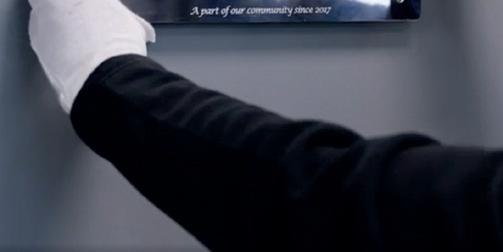

Exclusively

In this issue:
Wayne Goldsmith of CBRE on the unique challenges of healthcare FM and his vision for attracting the next generation to the sector
Pestokill MD Dave Clements reflects on four decades in the industry



for FM industry leaders

August 2025
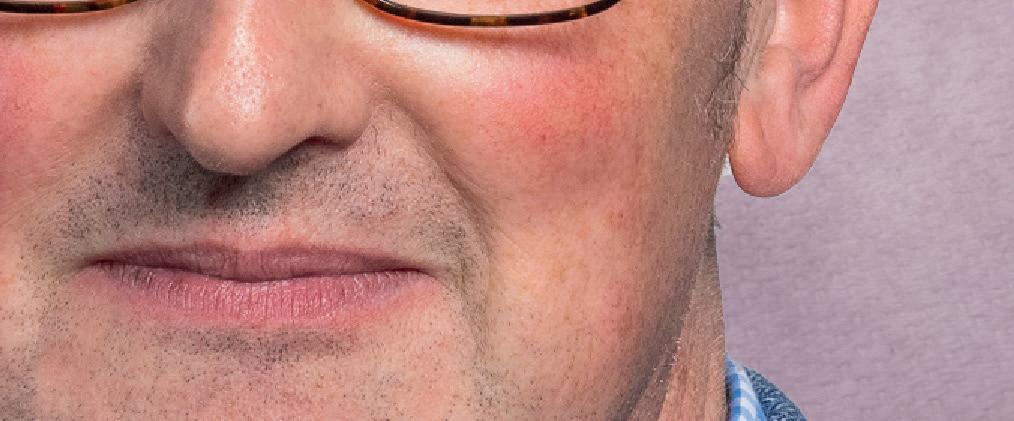


Mark Whittaker
General Manager of Thomson FM Limited and outgoing Chair of the Institute of Workplace & Facilities Management, reflects on his time leading the profession’s representative body

Sponsored by


Welcome to August’s edition of FM Director
You’re in for a treat this month! The team has been super busy behind the scenes putting together a fantastic collection of interviews and features for you from across the FM world.
In this edition I am pleased to share with you my interview with Mark Whittaker, the outgoing chair of the IWFM. I met with him earlier this month and he told me all about his work with the organisation during his tenure, what’s he’s most proud of, and his legacy as he hands over the reins.
We also speak to Andrew Thompson from Skyform about the exciting and innovative areas the company is expanding into, such as robotic façade cleaning, as well as the journey the company has been on since his father established it almost 40 years ago.
And as if that’s not enough, we also hear from Dave Clements from Pestokill, Wayne Goldsmith from CBRE, Callum Macleod from ABFM and Stamp Out Slavery, Stuart Bellew from Q3, Kelly Dolphin from SBFM and many more!

As always I hope you enjoy this edition, and remember, please reach out to me if you have anything you’d like to share about this fantastic industry.
Thanks
Claire Middleton
claire.middleton@businessdailygroup.co.uk










01482 782287
fmdirector@fmbusinessdaily.com
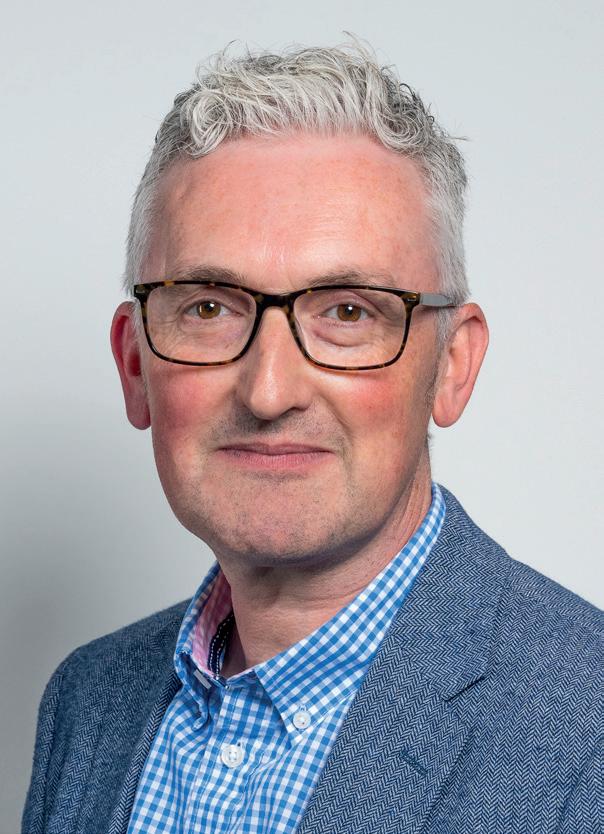
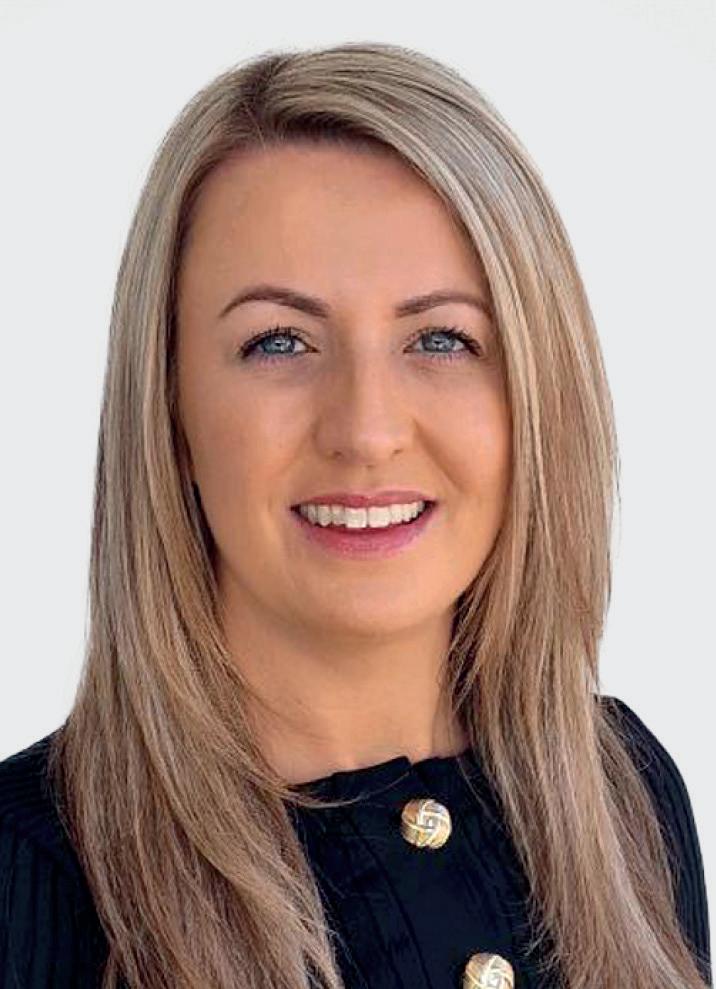
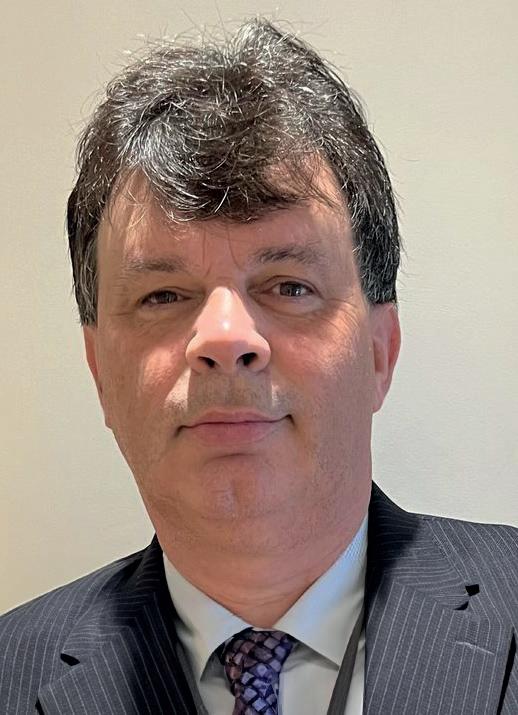
Passing the torch Mark Whittaker reflects on leading the FM industry through transformation
Managing Editor
Claire Middleton
From grass roots to change maker: How Kelly Dolphin is Leading Industry Change
Speaking exclusively to FM Director, Kelly Dolphin, Chief People Officer at SBFM, shares her remarkable journey in FM, from where her eyes were first opened to the cleaning sector, to industry leader and how her company is pioneering social mobility within facilities management
Designer and Production Manager
Chris Cassidy
Production Editor
James Jackaman
Stamping Out Slavery in FM
By Callum Macleod, CEO, AMFM, and Founder & Managing Director of Stamp Out Slavery
Sales Manager
Louise Bristowe-Harrison
Managing Director
Cheryl Ellerington
Published by FM Business Daily, Linacre House, Dark Lane, Braunston NN11 7HU © 2025 FM Business Daily. All rights reserved. Reproduction of the contents of this magazine in any manner whatsoever is prohibited without prior consent from the publisher. No part of this magazine may be used or reproduced in any manner for the purpose of training artificial intelligence technologies or systems. For subscription enquiries and to make sure you get your copy of FM Director please ring 01482 782287 or email fmdirector@fmbusinessdaily.com The views expressed in the articles reflect the author’s opinions and do not necessarily reflect the views of the publisher and editor. The published material, adverts, editorials, images and all other content is published in good faith.


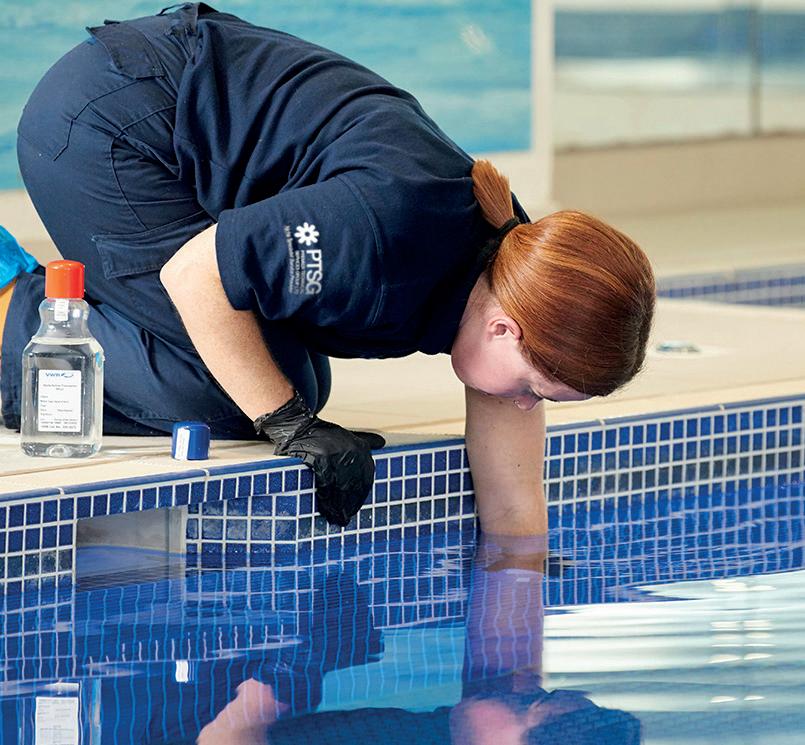
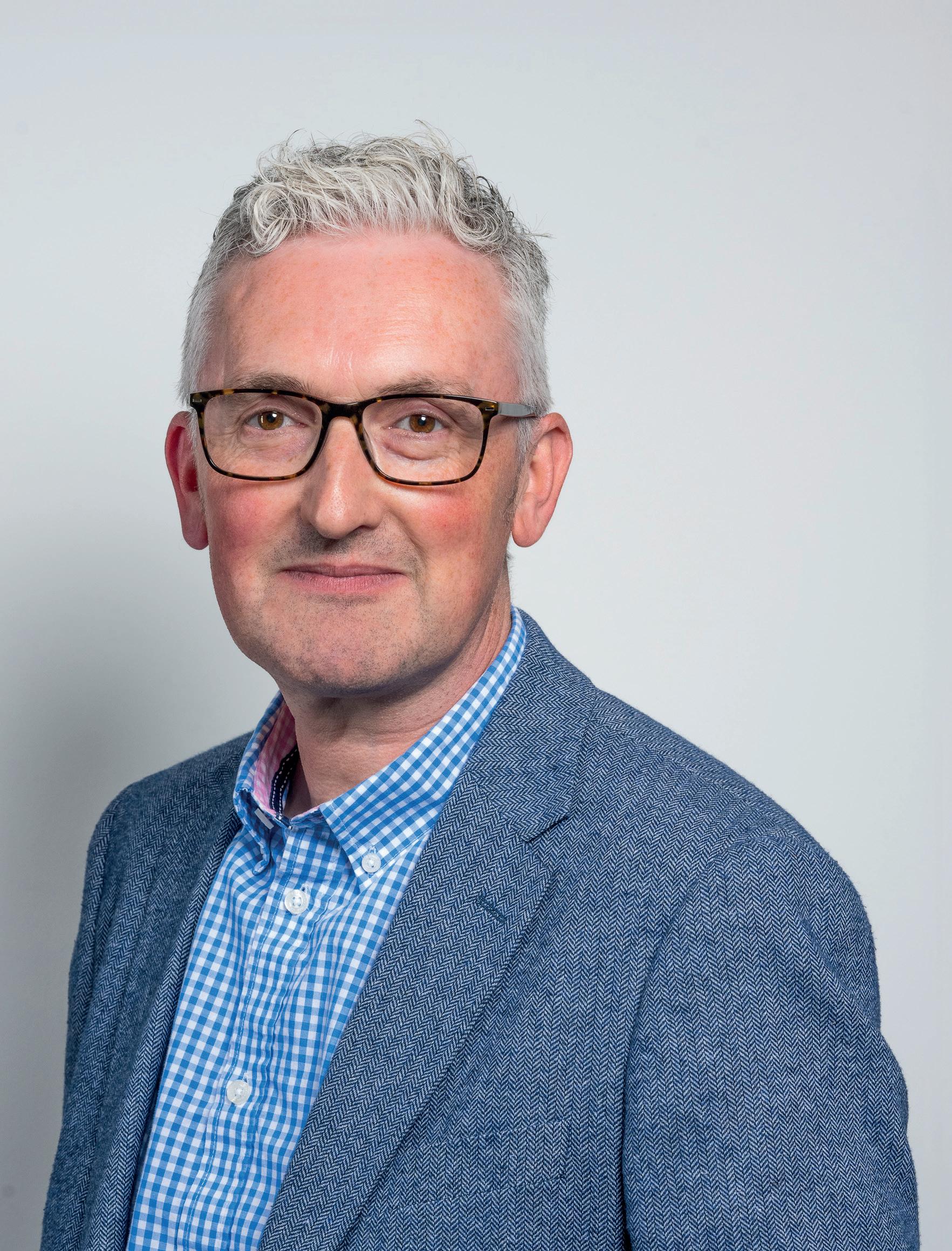
Passing the torch
Mark Whittaker reflects on leading the FM industry through transformation

Speaking exclusively to FM Director, Mark Whittaker, CIWFM, General Manager of Thomson FM Limited and outgoing Chair of the Institute of Workplace & Facilities Management, reflects on his time leading the profession’s representative body and the challenges facing the industry.
After four years at the helm of the Institute of Workplace & Facilities Management (IWFM), Mark Whittaker is preparing to pass the Chair role to his successor, Andrew Hulbert.
His tenure has been the longest in the Institute’s 30-year history, extended from the traditional two years to allow for greater continuity and impact.
Mark’s involvement with the IWFM began 15 years ago when he started volunteering with the organisation, initially as a regional volunteer in Lancashire before progressing to chair of the North Region.
“I didn’t set off volunteering with the Institute with a grand plan to someday be Chair, it’s just progressed that way,” Mark said. “But I’ve always had a passion for working and volunteering with the Institute and trying to promote the profession and also to try and encourage others to join the profession as well.”
Navigating industry transformation
During his tenure, Mark has witnessed significant changes across the FM landscape. “The skills shortage seems to be getting worse and is a real concern for a lot of those within the industry,” he noted.
“There’s been certainly a greater expansion in understanding and the use of data to support facilities management services, but also just how the workplace functions and the workplace experience seems to have evolved as well over the last four years.”
The return to office strategies, workplace experience programmes, and the integration of decarbonisation initiatives have all shaped the profession during this period.
Mark particularly highlighted the growing focus on equity, diversity and inclusion as organisations seek to attract new talent into the sector.
The skills shortage seems to be getting worse and is a real concern for a lot of those within the industry

Addressing the skills crisis
The skills shortage remains one of Mark’s primary concerns for the industry. Recent NHS England figures he cited showed that 41% of their estates and FM workforce is aged 55 or older, with only single-digit percentages under 25.
“They’re really worried that as soon as these people decide to retire, they’ll suddenly have a significant number of vacancies to fill and concerns about being able to recruit the sufficient number of people, with the required skills, knowledge and experience,” he said.
It can’t just be the race to the bottom of the cheapest cost for FM services
Mark advocated for a multi-pronged approach to tackling this challenge. “We need to get into schools and speak to young people about the profession,” he said, referencing the Institute’s Career of Choice initiative. “But it has to be as an industry collective – it can’t just be the Institute promoting this. We need more and more FM organisations to be doing that proactively and collaboratively.”
Beyond recruitment, Mark emphasised the importance of retention through career advancement, training, and competitive salaries and benefits. “Clients need to understand that to be able to deliver the services, organisations need to be able to pay competitive wages. It can’t just be the race to the bottom of the cheapest cost for FM services,” he explained. “When you’ve got an industry where net margins are still regularly at between 3 and 4%, there’s not a lot of room for a lot of these FM companies to look at wage structures.”
Achievements and legacy
Reflecting on his time as Chair, Mark highlighted three key achievements: building a more diverse Board, returning the Institute to profitability after seven years, and strengthening the executive team alongside CEO Linda Hausmanis.
“If I’m reflecting about my time as Chair, it’s what the Institute has achieved as a collective,” Mark emphasised. “It’s been a team effort within the board and wider IWFM team. One of the things I’m really proud about is how diverse a Board we’ve got.”


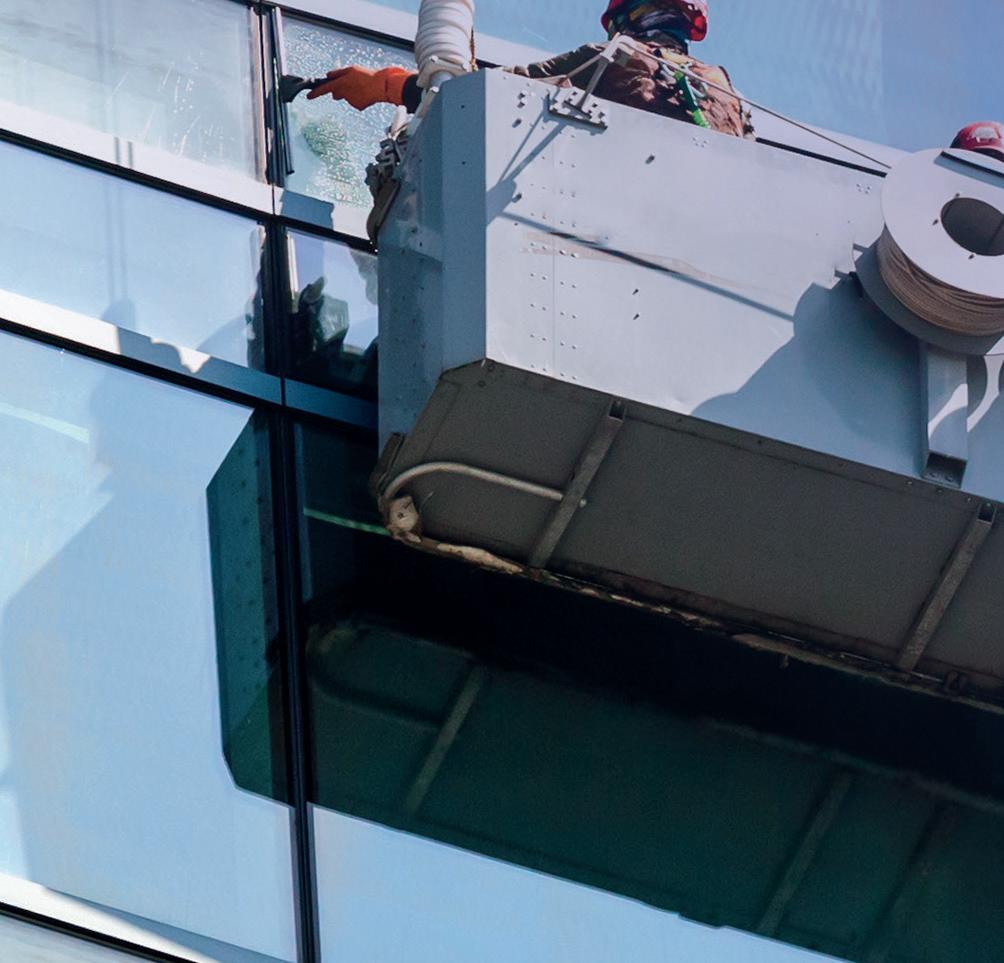



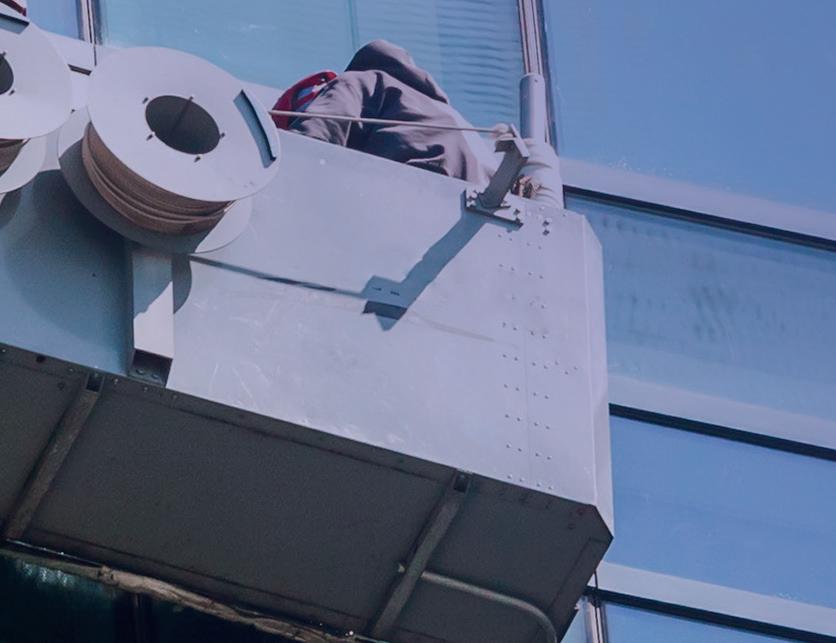




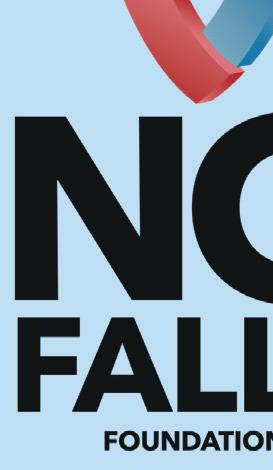
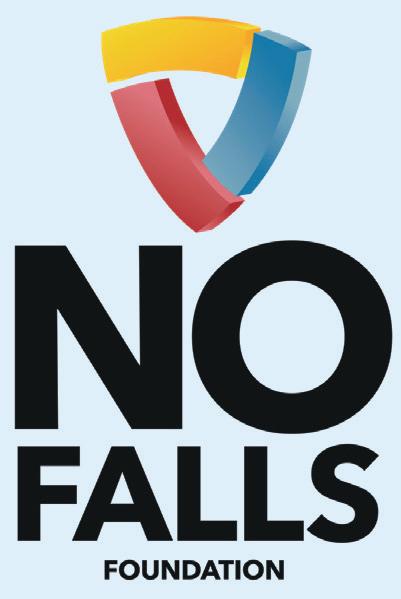
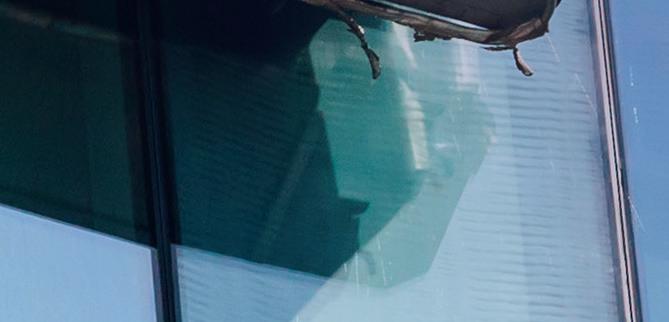






The financial turnaround has been particularly significant. “Coming out of the COVID pandemic and being loss-making, this year was the first year in around seven years that the Institute has posted an operating profit,” Mark noted.
Looking forward
As Mark prepares to hand over to Andrew Hulbert, he expressed confidence in his successor whilst acknowledging the ongoing challenges.
One area where he wished more progress could have been made was the Institute’s path to chartered status. “I would have loved it if we could have achieved that much quicker, but I understand the reasons why we can’t necessarily do that,” he said.
His message to Andrew is characteristically straightforward: “I would tell him to enjoy it! Andrew is such a successful businessperson and what he’s achieved already in facilities management is hugely impressive.
“He’ll be a great force for having a unified board behind him because that’s his character.”
Mark’s commitment to the profession extends beyond his formal role. Having worked in facilities management for over 20 years, with previous experience in social housing, he remains passionate about promoting FM as a career choice.
One of the things I’m really proud about is how diverse a Board we’ve got
As the Institute looks to the future under new leadership, Mark’s four-year tenure will be remembered as a period of stabilisation, growth, and renewed focus on the profession’s core challenges. His emphasis on collective action, diversity, and member engagement has helped position the IWFM for the next phase of its development, even as the industry grapples with skills shortages and evolving workplace demands.
“At the end of the day, the Institute is a member organisation and it’s been an honour to be able to represent members,” Mark reflected. “As a Board we are there as representatives of our membership really, and I have never lost sight of that.”











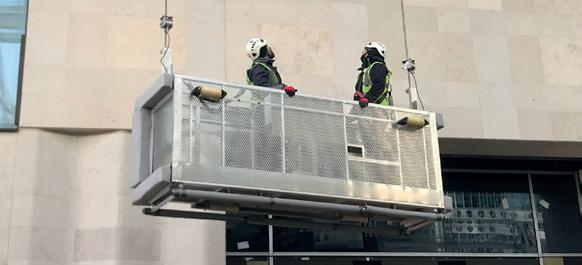



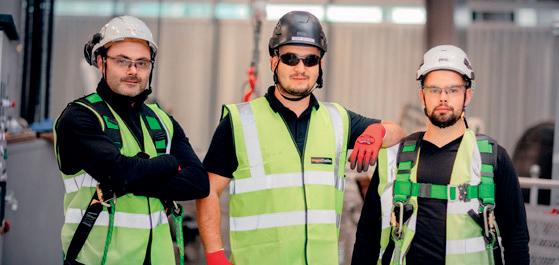
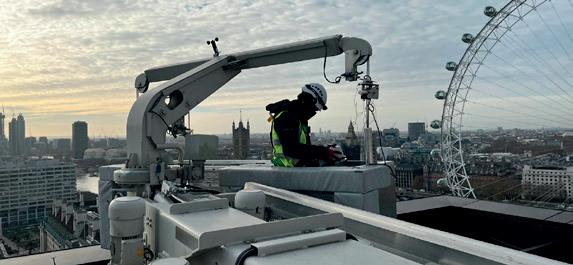


The End of Emergency Pest Control: Why Prevention Beats Reaction
Speaking exclusively to FM Director, Dave Clements, Managing Director at Pestokill, reflects on four decades in the industry, the shift towards smart monitoring systems, and the company’s strategic rebranding under the Anticimex banner

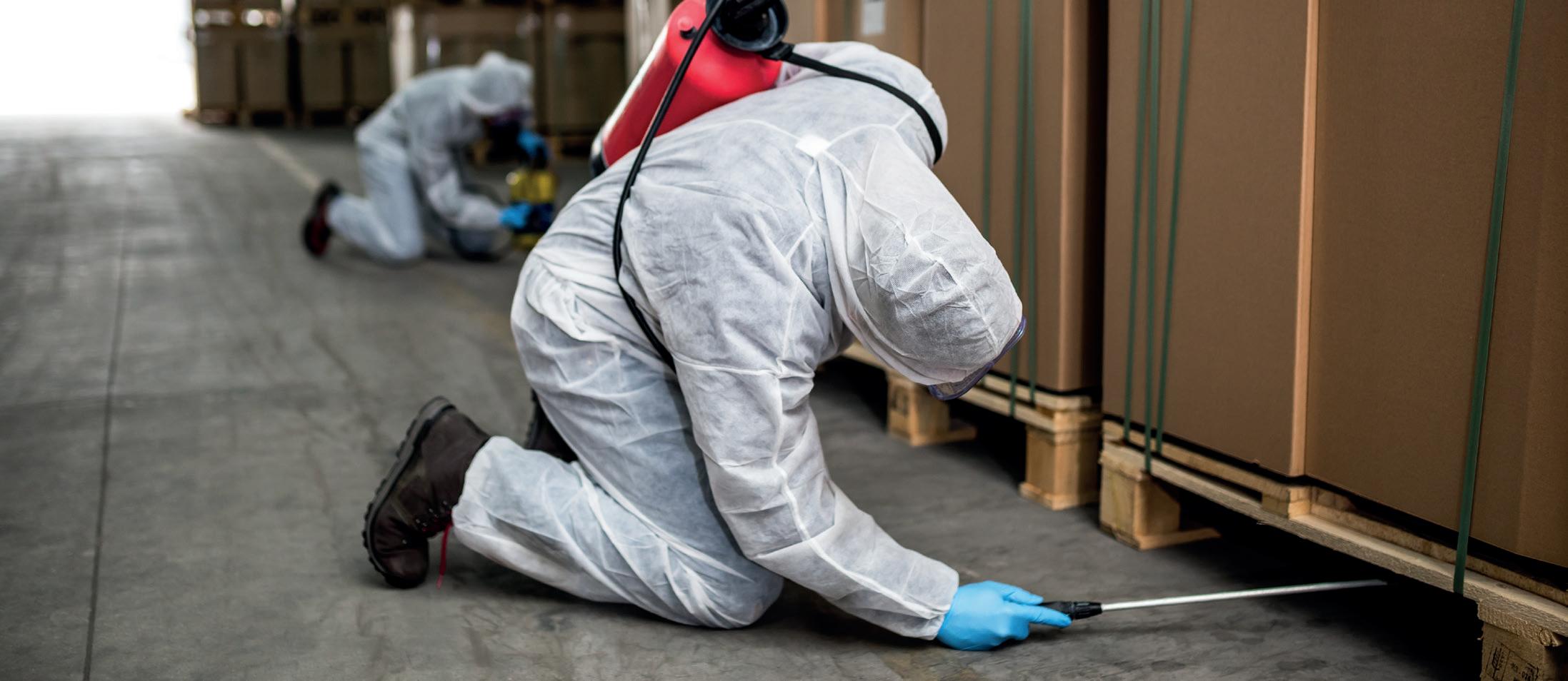
As the pest control industry marks significant consolidation and technological advancement, few leaders have witnessed its transformation quite like Dave Clements.
With next month marking 40 years in the pest control industry for Dave personally, and coinciding with the third anniversary of Pestokill’s acquisition by Anticimex, the timing provides a unique perspective on an industry in flux.
“It’s quite an interesting time,” Dave reflected. “A lot of the smaller, longest established companies that were operating in the local market have been acquired, and therefore the choice is reducing of what companies you can select.”
This consolidation has seen Pestokill itself actively participate in the market transformation. Over the past three years under Anticimex ownership, the company has acquired six pest control companies around the UK, contributing to what Dave described as “a full consolidation of the pest control market with operators becoming national service providers.”
Integration and Local Service
The past 12 months have been particularly focused on integration, with Pestokill concentrating on bringing their acquisitions into their established business model. This approach centres on decentralised branches operating around the UK to provide local service to clients, a strategy that maintains the personal touch that many smaller operators were known for whilst delivering the resources of a larger organisation.
The timing of this consolidation has coincided with evolving client expectations, particularly around sustainability. “Clients now very much have sustainability on their mind,” Dave noted. “Managing the environment, reducing energy consumption and being more sustainable with service delivery, so vehicles being more efficient and route planning being more efficient.”
The Smart Revolution
However, it’s the technological transformation that represents the most significant shift in the industry. Dave emphasised how Anticimex’s positioning as “the modern pest control company” is fundamentally changing the approach from reactive elimination to proactive monitoring and management.
“There’s more of a move towards monitoring and managing the pests on the site rather than elimination,” Dave explained. “We do still get reactive situations where there’s a rat in the kitchen and people need an urgent response. But we are finding that monitoring movement and managing the pests around the site are much more important because if we can detect them early on, then we can control and eliminate them.”
This shift towards smart monitoring systems offers significant advantages over traditional methods. The technology includes motion detection and smart devices that not only catch and kill but, more importantly, monitor pest activity across sites. “When they enter the building, we detect them and can then take action,” Dave said.
The benefits of early detection extend beyond simple efficiency. “If we catch them early, we catch one coming in and we’re only controlling one rodent or one pest,” Dave explained. “Whereas in the past, we would wait two or three weeks until we found there was pest activity and then we would control them with traps or pesticides.”
Traditional methods also face the challenge of pest adaptation. “Often the pests are getting cleverer and learning what systems we have, avoiding our traps and avoiding our pesticides,” Dave noted. “But with smart devices, we’re dealing with a much smaller population to eradicate.”
With smart devices, we’re dealing with a much smaller population to eradicate

Prevention Rather Than Cure
This technological evolution aligns with a broader industry shift towards preventative approaches. “It is very much about prevention rather than cure,” Dave emphasised. “A lot of our clients have pest control to monitor and prevent pests rather than to control them from getting established in the first place.”
The new approach utilises what Dave described as “the new armoury”, a combination of smart devices and latest generation pesticides that are proving innovative in pest control applications. This technological advancement, combined with early detection capabilities, is reshaping how the industry operates.
The Anticimex Rebrand
Looking ahead, Pestokill is preparing for a significant strategic change that will see all its UK operations rebranded under the Anticimex banner. This move will consolidate various acquired brands under a single, internationally recognised identity.
“We’re going to rebrand our operation into Anticimex in the UK so that we can use shared promotional material,” Dave explained. The strategic advantage extends beyond marketing efficiency, offering clients continuity across international operations.
“We are a large company in Spain and France and Germany and Holland and Belgium and the Nordics,” Dave noted.
“Many clients have cross-border or inter-country sites, so we’ll be known for delivering a service in Belgium or France or Spain.”
This rebranding represents more than a cosmetic change, it positions the UK operation to leverage the global Anticimex network whilst maintaining the local service model that has proven successful. “We’ll start then to build and grow the Anticimex brand, which will change some of our advertising and marketing going forward,” Dave added.
As the pest control industry continues its evolution from traditional reactive services to sophisticated monitoring and prevention systems, companies like Pestokill we mean Anticimex are demonstrating how consolidation, technology, and strategic positioning can create enhanced value for FM professionals.
The shift represents not just technological advancement, but a fundamental reimagining of how pest control integrates with broader facilities management strategies focused on sustainability, efficiency, and proactive building management.
For FM professionals, this evolution offers the promise of more predictable, sustainable, and effective pest management, moving from the emergency response model to integrated facility monitoring that prevents problems before they impact building users.
We’re going to rebrand our operation into Anticimex in the UK continuing to provide trusted local service delivery, whilst back by global Smarter innovative systems
SMART PEST SYSTEMS
Digital, intelligent, and always one step ahead.
Transform the way that you protect your premises from pests with the proactive Smart system.



24/7 Remote Monitoring
Spots problems before you do— no more nasty surprises


Eco-Friendly Solutions
Protecting your environment while eliminating pests

Custom Service Plans



Tailored solutions for your unique business needs
THE SMARTER APPROACH TO PEST CONTROL



Round-the-clock monitoring keeps you protected
Identify hidden problem areas before they become costly
Prevent expensive infestations with early intervention
Automated reporting & compliance saves you time
Hassle-free protection so you can focus on your business


READY TO SEE THE FUTURE OF PEST CONTROL? expensive
smart247@pestokill.co.uk pestokill.co.uk
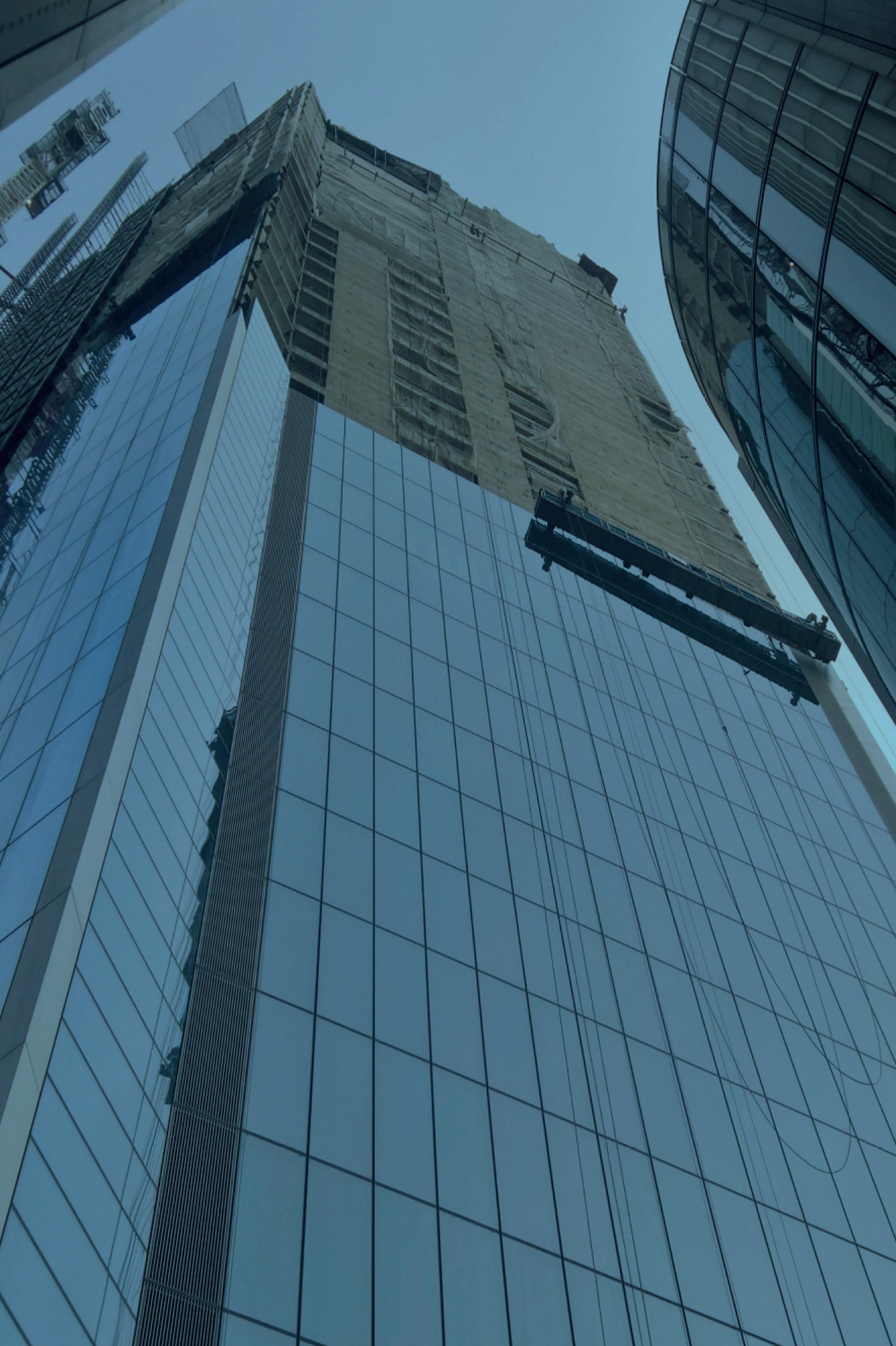
How Skyform is Revolutionising Building Maintenance with Robotic Solutions

When Andrew Thompson took the helm at Skyform 6 years ago, he inherited more than just a family business - he inherited a legacy of innovation that began when his father founded the company in 1988. Now, as director of the 35-strong London-based firm, Thompson is steering the company into uncharted territory with robotic facade cleaning and solar panel maintenance systems that could transform how we maintain Britain’s buildings.
A Technical Foundation Built from the Ground Up Andrew’s journey to the director’s chair wasn’t handed to him on a plate. After training as a lift engineer and working in the motor industry, he joined Skyform on the bottom rung, maintaining machines and working on sites with his tools in hand.
“I started from essentially the bottom - maintenance on machines, working on sites on the tools,” Andrew explains. “Eventually I learned the job and came up through the company over 11 years. I went from the towers to the office and learned how the business works from a real boots-on-the-ground perspective.”
This hands-on experience has proved invaluable as he’s grown the business from its traditional roots in high-rise access work into new territories across Birmingham, Liverpool and as far north as Scotland.
We always kept coming up with one major problem: the BMU doesn’t work so, we saw a little gap in the market
The Weight of Leadership
Andrew Thompson is refreshingly candid about the unique pressures of running a family business. “It can be a lonely place, being a director,” he admits. “No one really speaks about that.” For Thompson, this solitude is intertwined with the immense weight of ultimate responsibility. “At the end of the day, it’s always your fault, even when it isn’t,” he states. “The buck stops with you.”
This internal pressure is compounded by the external unpredictability of managing a team. Thompson recounts a familiar scenario with a wry laugh: “People will ask, ‘Why did that person do that?’ The truth is, I don’t know—I’m not in control of them. But you’re the one who has to answer for it.”
Despite these trials of isolation and accountability, his leadership has proven effective. Andrew has successfully steered Skyform to become what he describes as “a good, healthy growing business,” earning an established reputation among tier-one contractors in the access and facade industries.
Spotting the Gap in the Market
It was while following contractors around on aftercare worksupplying lift and cleaning cradle systems for glass replacement - that Thompson identified a significant problem plaguing the industry.
“We always kept coming up with one major problem: the BMU doesn’t work,” he explains, referring to Building Maintenance Units - the primary means of access for cleaning tall buildings. “So, we saw a little gap in the market. When we’re following around these buildings and the building maintenance unit doesn’t work, which is their primary means of access, they’re pretty stuffed.”
Traditional alternatives like rope access come with their own headaches. “I think it’s a bit of an uncontrolled cost and uncontrolled narrative,” Thompson notes. “We’re going to turn up, it’s windy and we can’t do it today. So that’s just cost you £750 for two blokes that day.”
If you can clean the building without having to put personnel on the outside of the building, it’s taking away a big risk factor
The Robotic Revolution Skyform’s solution centres on robotic cleaning systems that can operate on existing building tracks, erected in approximately four hours and capable of cleaning far more surface area than manual methods.
“If you can clean the building without having to put personnel on the outside of the building, it’s taking away a big risk factor,” Andrew emphasises. The technology isn’t just about efficiency - it’s about safety and reliability.
The company is particularly focused on solar panel cleaning, recognising the growing importance of renewable energy infrastructure. “We’re looking at warehousing, retail structures - all those sorts of areas,” Andrew explains. “There are a few solar panel cleaning companies, but definitely the facade cleaning robot solves a lot of problems for building managers.”
Ambitious Plans for the Future
Andrew’s vision extends beyond simply providing cleaning services. He’s setting his sights on influencing building design from the earliest stages.
“The idea is to try and get involved at the architect level and say ‘right, we don’t need a BMU because we can use this robotic system,’” he reveals. “The client’s going to save a lot of money on not having the BMU, not having insurance for the BMU, not having the maintenance of the BMU.”
It’s an ambitious goal that could fundamentally change how we approach building maintenance. “Whether we get there or not is to be seen, but certainly if you’re coming in at tender stage and you’re having your system specified, then it’s pretty much a guarantee that that’s what they’re using for their buildings moving forward.”
Looking Ahead
For Andrew, the next five to ten years represent a period of strategic expansion while maintaining the core construction business that has sustained Skyform for over three decades. The company has recently acquired another operator in their field and is focused on establishing itself in the facade and solar cleaning arena.
“I don’t think there’s many people out there doing what we’re trying to bring in at the moment,” he says confidently. “I’m talking to building managers where their BMUs don’t work - they haven’t been able to clean parts of the building for four or five years.”
As Andrew continues to balance the demands of leadership with family life - particularly important given his daughter’s recent health challenges - he maintains the adaptability that has characterised Skyform’s evolution.
“One thing we are good at here is not slipping into that ‘well, this is how we’ve always done it,’” he reflects. “It’s always changing.”
In an industry often resistant to change, Skyform’s embrace of robotic technology represents more than just innovation - it’s a practical response to real-world problems that have plagued building maintenance for years. Under Andrew’s leadership, this family business is positioning itself at the forefront of a technological revolution that could reshape how we maintain our built environment.
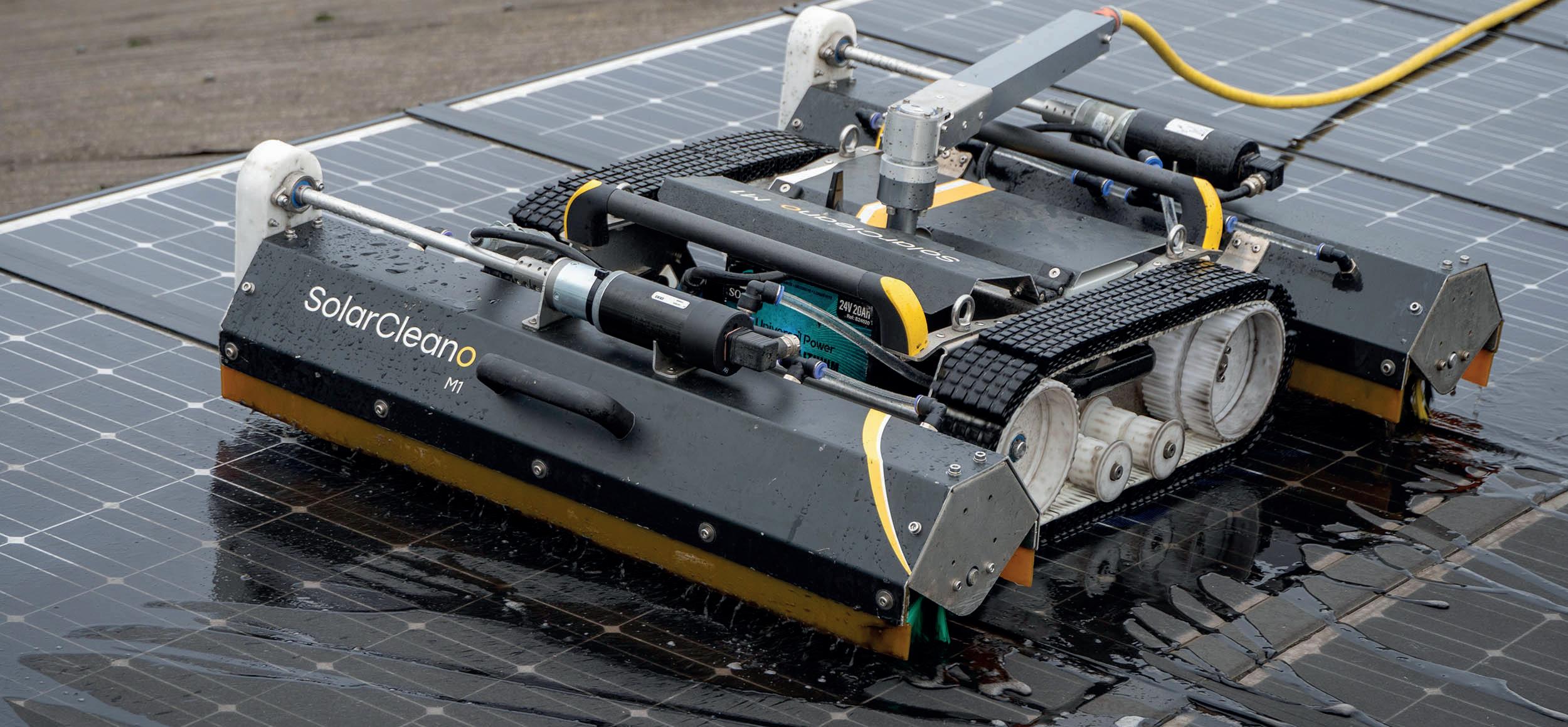



Every hour of cleaning worth more
At JR&Co, we focus on doing things carefully.
Our clients are organisations that are unwilling to cut corners. So, we give their premises our close, undivided attention.
Everything we do is designed to enable our people to focus on their performance. We support our teams with training, technology and fair reward.
We only work in London, which ensures our people and resource are always close. And we never stretch them too thinly. We make sure our managers have time and space to support our cleaners and to respond to your needs.
That level of attention makes every hour of cleaning worth more.
To find out the difference our careful approach can make to your premises, just get in touch.
We’re waiting to give you our undivided attention.



Ensuring Safety from Day One
How SSIP Revolutionises Contractor Compliance

If your business in the construction and maintenance sectors relies on contractors, understanding true contractor safety means looking beyond the visible signs of PPE and checklists.
It’s about ensuring every individual your company brings onto a site – for complex projects, routine maintenance, or specialised tasks – is legally compliant, demonstrably competent, and committed to working safely from the moment they arrive.
This crucial need is precisely where Safety Schemes in Procurement (SSIP) becomes indispensable, enabling robust contractor oversight and legal adherence for your operations.
As Eleanor Eaton, SSIP Chair, highlights: “In today’s construction and maintenance sectors, real safety starts with knowing your contractors are fully compliant and competent from day one — and that’s exactly what SSIP delivers. It cuts through duplication, verifies legal compliance with a single assessment, and empowers buyers to focus on genuine site risks, not endless paperwork.


“For contractors, it’s more than a tick-box — it’s a path to improvement, professionalism, and trust. SSIP doesn’t just streamline procurement; it transforms it into a smarter, safer, and more efficient process that works for everyone involved.”
SSIP’s multifaceted influence provides a streamlined, efficient, and legally sound framework that ultimately fosters a safer working environment across the UK, benefiting both contracting businesses and their hired teams.
For contractors, it’s more than a tick-box — it’s a path to improvement, professionalism, and trust
Core Legal Compliance Through a Single Assessment
At the heart of SSIP’s effectiveness is its commitment to core legal compliance. SSIP member schemes rigorously apply a set of Core Criteria, meticulously approved by the Health and Safety Executive (HSE). These criteria are directly aligned with the fundamental requirements of key UK health and safety legislation, including:
The Health and Safety at Work etc. Act 1974
The Management of Health and Safety at Work Regulations 1999
The Construction (Design and Management) Regulations 2015 (CDM 2015)
When a contractor undergoes assessment by an SSIP member scheme, the evaluation comprehensively verifies their adherence to the basic legal duties mandated by UK health and safety law. This independent verification provides invaluable assurance to buyers, instilling confidence that a prospective supplier has met a baseline of legal compliance before engaging them for work.
Reducing Duplication, Sharpening Focus on Site-Specific Risk
Before the widespread adoption of SSIP, contractors frequently faced a labyrinth of prequalification assessments. Each client often demanded similar health and safety documentation, leading to significant duplication of effort, unnecessary administrative burdens, and inflated costs. This fragmented approach often diverted attention away from the real priority: site-specific risks.
SSIP has revolutionised this landscape:
A contractor undergoes a single assessment by any accredited SSIP member scheme.
This assessment is then mutually recognised across all other SSIP member schemes, eliminating the need for repetitive evaluations.
The completed assessment is readily accessible to buyers via the central SSIP portal, enabling effortless verification.
This streamlined process allows both suppliers and buyers to redirect their energy and resources towards meaningful, real-world safety planning and proactive risk management, rather than getting bogged down in redundant paperwork.

Streamlining Prequalification for Buyers
For procurement professionals and buyers, SSIP offers a powerful tool for streamlining their prequalification processes while ensuring due diligence. SSIP empowers buyers to:
Effortlessly verify that potential suppliers meet the HSEapproved Core Criteria.
Simplify procurement through the principle of mutual recognition.
Avoid over-specifying health and safety documentation for low-risk contracts, applying a proportionate approach.
Clearly demonstrate due diligence in the critical task of selecting competent suppliers.
Shift project-specific checks to focus on genuine site risks, rather than duplicated documentary evidence.
Real safety starts with knowing your contractors are fully compliant and competent
For instance, if procuring an electrical contractor for a highrisk environment, a buyer can quickly confirm their SSIP assessment and then allocate resources to conduct additional, highly specific verifications relevant to the project, such as checking specialised electrical qualifications, reviewing prior performance data, or scrutinising detailed safety method statements.
Empowering Contractors to Meet Their Duties
For contractors, the SSIP assessment is far more than a simple pass/ fail exercise; it’s a valuable developmental process. It actively helps organisations:
Identify any gaps or weaknesses in their existing safety management systems.
Deepen their understanding of their legal duties, particularly under CDM 2015.
Cultivate a stronger, more proactive culture of continuous improvement in safety.
Unequivocally demonstrate their unwavering commitment to safe, professional operations.
Crucially, many SSIP member schemes extend further support and guidance, assisting contractors in addressing identified deficiencies and progressively elevating their health and safety standards over time.
Encouraging Proportionate and Fair Safety Management
SSIP is a staunch advocate for proportionate safety management. It actively encourages buyers to avoid overburdening small businesses or those engaged in inherently low-risk activities with excessive health and safety demands.
For low-risk work, evidence of a basic health and safety policy or fundamental risk controls may be entirely sufficient.
Conversely, for high-risk activities, SSIP plays a vital role in ensuring that only competent, fully compliant suppliers are engaged.
This balanced approach supports both rigorous legal compliance and practical, efficient project delivery, ensuring that procurement processes remain safe, smart, and commercially viable.
The Value Proposition of SSIP
In summary, SSIP adds significant value for both sides of the procurement equation:
For Buyers For Contractors
One-stop access to verified assessments Independent assessment of legal compliance
Reduces duplication and speeds up procurement
Demonstrates due diligence under CDM & HSW law
Mutual recognition avoids multiple certifications
Helps meet CDM 2015 and HSW Act duties
Encourages proportionate assessment for low-risk work Supports continuous improvement & better safety culture
SSIP is more than just an Assessment Scheme; it’s a strategic partner in fostering a culture of safety, efficiency, and legal compliance across the UK’s contractor landscape. To enhance your contractor oversight and achieve significant time and cost savings, explore how leveraging the SSIP portal can revolutionise your health and safety management.
To learn more about SSIP go to our website ssip.org.uk

SSIP is more than just an Assessment Scheme; it’s a strategic partner in fostering a culture of safety, efficiency, and legal compliance

From grass roots to change maker: How Kelly Dolphin is Leading Industry Change
Speaking exclusively to FM Director, Kelly Dolphin, Chief People Officer at SBFM, shares her remarkable journey in FM, from where her eyes were first opened to the cleaning sector, to industry leader and how her company is pioneering social mobility within facilities management

Kelly Dolphin’s entry into the facilities management world began when she was working as aparttime cleaner in a Bradford mental health institute alongside sixth form college at the age of 16
Nearly 24 years later, she has risen to become Chief People Officer at SBFM, one of the industry’s most innovative cleaning companies, but her frontline experience continues to shape everything she does.
“I worked as a cleaner whilst I was in sixth form, and although I worked for an agency, I felt like I worked for the NHS because I had more of an affinity with them as a client,” Kelly recalled. “I never saw the agency – they never bothered to come and train me or do anything. I was just thrown in.”
This early experience of being overlooked and undervalued as a frontline worker would prove to be the driving force behind Kelly’s career mission: transforming how the industry treats its most essential employees.

Building a Platform for Change
Kelly’s journey through various FM companies revealed a consistent pattern of neglect towards frontline workers. “It was just the same as when I worked as a cleaner all those years ago. Nothing had changed. We’ve got these people in low skilled, low paid roles and they’re just left to it. They’re not trained, they don’t even know who the manager is,” she explained.
This realisation sparked Kelly’s determination to create change. She established herself as an apprenticeship training provider, focusing on getting people into education and better opportunities. When SBFM’s owner, Colin Shute, approached her to join the business, Kelly saw the perfect vehicle for her vision.
Cleaning is the first thing to get cut because people think we can do without it, and they just chip away at it
“I came to SBFM and I am now working at a company where there’s no red tape. There’s never a no, it’s a ‘yeah, give it a go’. You can try it if you want,” Kelly said. “What we’ve done with SBFM is we kind of treat it like a bit of a vehicle to social mobility.”
The EVOLVE Revolution
The centrepiece of SBFM’s approach is their groundbreaking EVOLVE programme, co-created by Kelly and CEO Matt Chapman. The initiative represents a radical departure from traditional FM thinking, instead of trying to retain cleaners indefinitely, SBFM actively helps them transition into better-paid roles with their clients.
“We came up with EVOLVE and initially the premise was to get people – existing cleaners – into roles with our clients,” Kelly explained. “We looked at Indeed research and what we saw was that people that end up in cleaning roles actually are clicking into logistics. They want to work in the warehouse or retail.”
The programme works by identifying what career paths cleaners actually desire, then creating training programmes to bridge the gap. SBFM partners with their clients in logistics and retail to provide direct pathways for progression.
“If we can help support them on that journey to get into a better opportunity and then leave us with a good experience, then why not celebrate that attrition and why not use their stories to inspire others?” Kelly asked.
The programme has since expanded to work with over 70 “impact partners,” including prisons, charities, and community organisations. One particularly innovative partnership sees SBFM target prison orderlies who then transition to working as cleaners at Pure Gym before being sponsored to complete personal trainer courses.
Industry First Innovation
SBFM’s approach represents an industry first. “I think SBFM are the first to do this as a comprehensive programme. I think now we’re seeing other companies looking at doing similar things,” she noted.
Rather than keeping their successful model secret, Kelly and SBFM have actively promoted it throughout the industry. “We want people to copy it. Most companies would keep it as their own secret recipe, but we have promoted it as much as possible,” Kelly said.
She has also personally pitched the concept to competitors. “We want other companies to do it because we want to impact the lives of cleaners,” she explained.
Meeting Modern Challenges
Like many in the industry, Kelly faces the ongoing challenge of budget cuts. “I think the struggle is the same for everyone at the moment with the cost increases. Cleaning is the first thing to get cut because people think they can do without it, and they just chip away at it,” she said.
“They’re expecting the same level of service from our cleaners that are out in the field with much, much fewer hours. So, it’s working out how we can ensure consistency of service but also make sure that our cleaners are being treated fairly, not being overworked and that they can do their job within the time they’re given.”
SBFM is addressing these challenges through technology solutions.
Growth and Innovation
Since Kelly joined SBFM three years ago as Learning and Social Impact Director, the company has experienced remarkable growth, increasing the number of employees five-fold through organic sales growth rather than acquisitions.
“I’d hope to still be here and achieve the ambitious growth plans that we’ve got. ,” Kelly said, talking about her plans for the next 3-5 years.
The company was recently recognised as one of the top four disruptors in Facilitate’s ‘Disruptive influences’ article in April 2024, an achievement Kelly described as “a really proud moment for us because we don’t want be the same as everyone else. We want to do things differently.”
A Commercial Approach to People
Kelly’s background has given her a distinctly commercial perspective on her people-focused role. “I think it’s key to be very commercially-minded in these roles. I got asked this recently on a HR working group – whether I think CPOs are always commercially minded? I don’t think they are,” she said.
This commercial awareness extends where Kelly also supports SBFM’s bid process. “You can see the impact of what you’re doing on the actual business as well,” she noted.
Beyond the Bottom Line
For Kelly, the motivation extends far beyond business metrics. The company’s work with prisons has even led to government funding from the Ministry of Justice to establish a cleaning academy within one of their prisons, where inmates receive training before their release.
“We work with these businesses to help and support people into our business, but then we put them on a pathway,” Kelly explained. The integration of social impact into every aspect of operations, rather than as a bolt-on initiative, sets SBFM apart from competitors.
“We didn’t actually promote it until we had some results, so we could share the impact of it first before we then shared the programme,” Kelly said. “We set up an internal committee and got people from every department, so they all had a lead because we needed to ensure the people joining our team had the right support.”
Looking Forward
As Kelly looks to the future, her ambitions remain firmly rooted in SBFM’s continued growth and the expansion of their social impact model. The company’s rapid expansion shows no signs of slowing, with Kelly hoping to remain at the heart of their ambitious plans.
“Because we are privately owned as well, we can get decisions really, really quick and it’s never a no. If something is of benefit to our customers, we always give it a go,” she said.
Kelly Dolphin and SBFM represent a powerful example of how business success and social responsibility can work hand in hand. Her journey from an overlooked teenage cleaner to industry innovator proves that the FM sector’s greatest asset has always been its people, they just needed someone to recognise their potential.
“We want to do things differently,” Kelly concluded, and in an industry ready for change, that’s making all the difference.







































































Stamping Out Slavery in FM
By Callum Macleod, CEO, AMFM, and Founder & Managing Director of Stamp Out Slavery
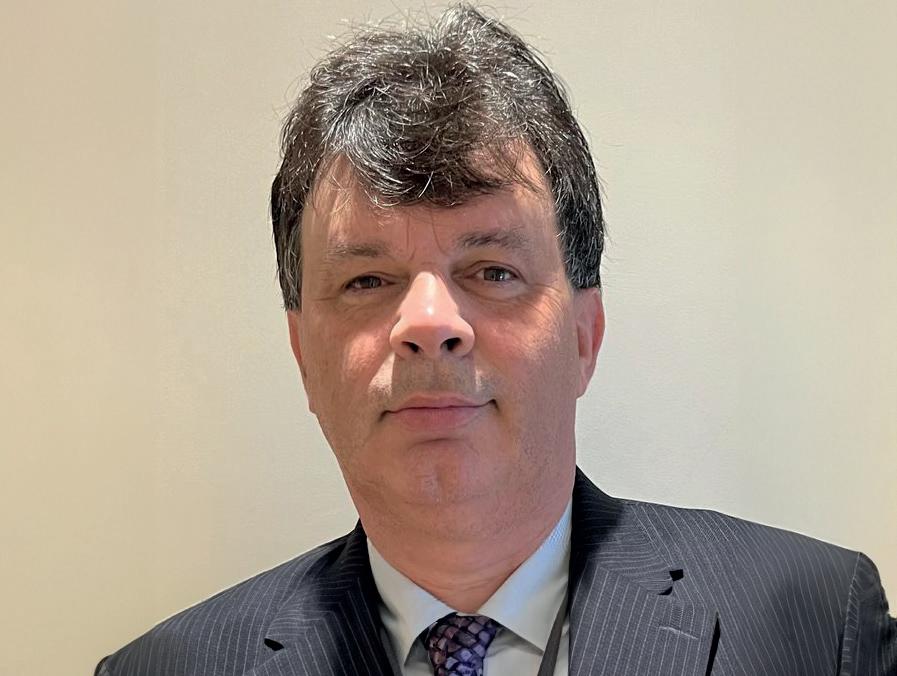
Both modern slavery and human trafficking are relatively unknown quantities in the FM arena, and so we caught up with Callum Macleod to find out more.
As well as being the CEO of leading independent cleaning & maintenance provider, AMFM, Callum is also the Founder & Managing Director of Stamp Out Slavery, an organisation that helps businesses to identify and address the risk of modern slavery and exploitation occurring in their labour supply chains.
Here, Callum explains more about the work of Stamp Out Slavery and its impact on the FM sector….
As much as I’d like to take credit for the initiative, the origin of Stamp Out Slavery (SOS) was a cross-industry panel put together by Ben Douglas-Jones KC about four years ago which I was invited to join by Lorraine Larman, then Warden and now Deputy Master of the Worshipful Company of Environmental Cleaners.

Construction, FM, Hospitality and Security had also been invited to participate by Ben, whose particular speciality is Human Rights and Modern Slavery and who is one of the authors of the practitioner’s handbook on the Modern Slavery Act 2015 (MSA). Ben and I exchanged thoughts on the understanding and application of the MSA in cleaning and he asked me if I would write a position paper on the approach which the commercial cleaning profession was taking to adherence to MSA principles.
Researching from a wide variety of sources, both formal and informal, my findings were that the MSA was not widely understood or applied by any companies which I had identified. At worst, companies were aware only of the s54 requirement for larger companies to provide a statement and believed that as a consequence the MSA was applicable only to those companies.
At best, and this remains largely true, companies adopted an audit exercise which sought only to elicit desired answers from their subcontractors with no additional investigation. My recommendation was that, in the absence of ever realistically hoping to find the non-compliant in an industry which has in excess of one hundred thousand entities looking to fulfil cleaning requirements, the best approach would be for someone with the time and the skills to create an external auditing and certification process.
The hidden dangers in both commercial cleaning and analogous industries lie in subcontracting and, less obviously, in recruitment
My reasoning was based on a few factors. Having a certificate which could be placed on website, emails and stationery automatically gave potential clients a resource which they could draw on to verify that appropriate checks were in place.
Having an external resource in place would be an invaluable resource for any companies who were being questioned by statutory bodies. The commitment to addressing modern slavery would, I hoped, be an incentive to properly inform all employees so that they knew what to look for, and what to do, in terms of modern slavery in the wider community. It was a good idea, I thought.
Ben and Lorraine agreed, and we formed the entity now known as SOS (My pleading to call it Larman, Lawman and Layman was dismissed before I’d finished the sentence!) and our soft launch at Armourers Hall in October 2023 was supported by, among others, former Independent Anti-Slavery Commissioner, Dame Sara Thornton MBE.
Our message is simple. Modern Slavery, or exploitation as it’s referred to in Scottish law, isn’t something which can be adequately addressed by including a line in terms of employment or by publishing a statement.
While the maximum life sentence which an MSA s1 breach allows for is genuinely improbable if there’s a significant breach in the supply chain, a prison sentence and/or a fine is a virtual certainty. And it’s a chain. A cleaning company which uses a subcontractor who is guilty of the offence confers liability on itself and its client – the repercussions flow up the supply chain and the reputational damage would almost certainly signal the collapse of a company.
The hidden dangers in both commercial cleaning and analogous industries lie in subcontracting and, less obviously, in recruitment.
As a general rule, the dominant ethnicity of cleaning operatives is informed largely by the ethnicity of the supervisor, the contract manager or the area manager. Two factors drive this; language barriers and the tendency for companies to look for referrals rather than advertise vacant positions at entry level.
I was very clear at the outset at what I do not want SOS to become
It’s a quicker process and some companies even offer incentives to operatives to make vacancies known to family and friends. That, as a moments’ thought would make clear, is a significant vulnerability.
There are instances known to SOS where the contract manager is doing one or more of the following:
Telling people that she can get them a job but they have to pay her an introduction fee.
Once employed, charging introduced employees a portion of their income each week.
Inflating an employee’s hours and taking the additional money in cash from the employee.
Forcing an employee to work unpaid overtime, or denying holiday, to mask budget creep as a consequence of those actions.
These practices can also be found in subcontracting either with or without the knowledge of the person who owns the subcontracting and with the additional risk factor that further breaches are being committed. It is all, in summary, a risk.
Most people reading this will be familiar with the employee ‘Fraud Triangle’ of Opportunity, Incentive and Rationalisation, and all three of those elements are never stronger than when in an industry which effectively sells labour.
At the heart of all employment relationships sits the implied duty of trust and confidence, from which arises the difficulty of posing questions to employees which are inquisitorial in nature. An employer has a right to ask but runs the risk of an innocent employee feeling aggrieved. An external entity asking the questions with a specific purpose removes that risk and also creates the ability of both current and past employees to expose the practices safely and anonymously.
I was very clear at the outset at what I do not want SOS to become. At the very top, we’re not a shadow Border Agency or HMRC helper, and my desire to assist is confined wholly to companies and individuals. If there are errors in the way a company is carrying out its activities, our job is to help correct them, not report them.
Additionally, SOS is not a union. The purpose of an audit is to establish whether there are vulnerabilities in relation to modern slavery.
An operative who uses the feedback form to complain about employment issues not related to exploitation does potentially worse than nothing because they may feel that they’ve reported an issue which SOS, for confidentiality reasons, cannot disclose to their employer.
In Summary…
Firstly, this isn’t a sales pitch for SOS. We charge for conducting audits because we give certificates to the companies we do them for, and we’d have to satisfy a statutory body if it ever came to an investigation that we had carried them out correctly. That said, we cheerfully give out the audits for free for companies to use themselves if they don’t need the certification and if there’s enough space in their company for hard questions without hard feelings.
Lastly, let’s copy Scotland. Slavery is an accurate term, but its historical connotations tend, I believe, to obfuscate. If someone is being forced to work or is having money taken from them in whole or in part or is living in fear, it’s because someone else is profiting from making that happen. That’s exploitation. Let’s call it what it is.
I can’t write this without acknowledging the invaluable Angie Morrish who has done everything to keep the wheels turning. I don’t take credit for the initiative, and I don’t take credit for our growing success – that’s all Angie.





It’s about ensuring every individual on your site is compliant, competent, and committed to safety from day one. This is where Safety Schemes in Procurement (SSIP) steps in. We offer robust contractor oversight and legal adherence for your operations, transforming how you manage safety.
As Eleanor Eaton, SSIP Chair, puts it:

“Real safety starts with knowing your contractors are fully compliant and competent from day one — and that’s exactly what SSIP delivers. It cuts through duplication, verifies legal compliance with a single assessment, and empowers buyers to focus on genuine site risks, not endless paperwork.”
Why Your Business Needs SSIP:
Single Assessment, Total Compliance: Meet core legal compliance (including CDM 2015) with a HSE recognised assessment. Get invaluable assurance your suppliers meet the baseline.
Cut the Red Tape: Say goodbye to endless prequalification forms. A single SSIP assessment is mutually recognised across all member schemes, saving you time and hassle. Focus on real-world risk management, not redundant paperwork.
Streamlined Procurement & Due Diligence: Easily verify potential suppliers via the SSIP Portal, simplify procurement, and demonstrate due diligence. Shift your focus to genuine site risks, not administrative burdens.

Legionella liability: The lawsuit you can’t afford
Why water safety oversights have become the most expensive mistakes in facilities management
While you’re reading this, your building’s water system could be hosting a microscopic party that might cost you everything you’ve worked for. The guest of honour? Legionella bacteria. And this is one party you definitely weren’t invited to.
Legionella is naturally occurring bacteria found in water sources that becomes dangerous when it multiplies in building water systems - particularly in warm water between 20-45°C. When people inhale tiny water droplets containing these bacteria from showers, cooling towers or air conditioning systems, they risk contracting Legionnaires’ disease, a potentially fatal form of pneumonia that kills 10-15% of those infected.
When organisations cut corners on water safety, the consequences aren’t just devastating for those who fall ill - they’re catastrophic for the businesses and individuals held responsible.
“What might seem like ‘just another regulatory burden’ can quickly transform into costly legal nightmares that ruin reputations and end careers,” explains XXX from HCS Water Treatment, a PTSG company - specialist water engineers with over 30 years’ experience in legionella control. “Ignoring water safety is essentially gambling with your organisation’s future - and the stakes have never been higher.”
The legal perfect storm Legionella-related litigation creates a uniquely challenging legal environment that’s particularly dangerous for facilities managers:
Strict liability standards mean you don›t need to have intended harm to be found legally responsible. Good intentions count for nothing when someone›s life is at stake.
Dual legal exposure creates the real danger - you›re facing both criminal prosecution by regulators and civil claims from affected individuals. It›s like fighting a war on two fronts.
Documentary evidence often provides the strongest case against you. Those monitoring records you›ve been putting off? They’re either your salvation or your downfall.
Personal liability means directors and managers can face individual prosecution, not just the corporate entity. Your personal assets could be on the line.
When prevention fails: real-world examples
The Royal United Hospital Bath case
In 2018, Royal United Hospitals Bath NHS Foundation Trust was fined £300,000 after a 68-year-old patient died from Legionnaires’ disease in July 2015. The HSE investigation revealed that the Trust had failed to put necessary precautions in place to minimise patient risk from Legionella exposure.
The investigation found that an annex to the William Budd Ward was on a separate water system loop - a critical fact the Trust hadn’t recognised from the annex’s opening in 2009 until the patient’s death in 2015. Required temperature checks and Legionella testing had not been carried out for six years. Sometimes the cost of cutting corners extends far beyond money.
The G4S workplace disaster
When G4S Cash Solutions failed to manage Legionella risks at its Harlow site, the investigation revealed systematic failure: risk assessments conducted by unqualified personnel, erratic monitoring and testing, inadequate staff training, and out-of-date policies stretching back years.
The result? A £1.8 million fine plus £34,000 costs after an employee contracted Legionnaires’ disease in 2013. Years of business relationships destroyed by preventable negligence.
One of the UK’s largest community outbreaks occurred in Edinburgh in 2012
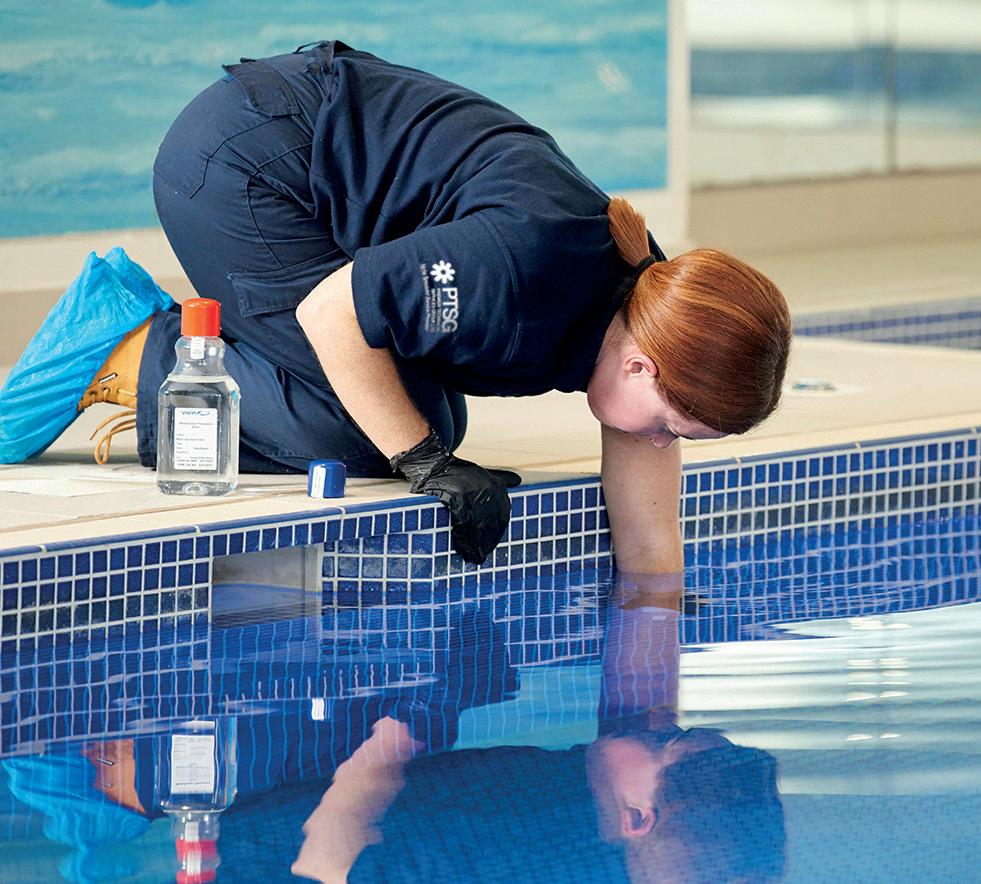
The
Edinburgh outbreak investigation
One of the UK’s largest community outbreaks occurred in Edinburgh in 2012 - 92 total cases (confirmed, probable and possible) and four fatalities. The source was believed to be cooling towers at industrial sites, but despite extensive investigation involving 28 investigators, 75 interviews and multiple companies, the exact source was never definitively identified.
Five companies were eventually charged under health and safety legislation in 2017, but the Crown concluded there was insufficient evidence for criminal prosecution related to the deaths. The case demonstrates how even extensive investigations can struggle to establish clear liability in complex Legionella cases.
The true cost calculation
When you see headline fines, remember they’re just the tip of the iceberg. The real cost includes:
Direct costs: Regulatory fines, legal representation, civil compensation, investigation expenses and business interruption.
Indirect costs: Insurance premium increases, increased regulatory scrutiny, staff time diverted to legal matters, management replacement and system improvements.
Reputational damage: Loss of contracts, customer confidence erosion, media coverage and recruitment challenges.
Many organisations find the indirect and reputational costs ultimately exceed the direct financial penalties.
The
prosecution patterns
Certain failings appear repeatedly in Legionella litigation:
Documentation deficiencies
Courts expect comprehensive records demonstrating proper water management. The most common failings include missing monitoring records, outdated risk assessments, no written scheme of control and lack of staff training documentation.
As lawyers say: “If it isn’t written down, it didn’t happen.”

Ignoring expert advice
Many prosecuted organisations had previously received warnings through consultant recommendations, internal audit findings, or staff concerns. These create a devastating paper trail showing awareness of problems but failure to act.
“We’ve seen organisations receive detailed consultant reports highlighting serious risks, only to shelve them due to budget constraints,” continues XXX from HCS. “When an outbreak occurs, these reports become smoking guns in court.”
Management system breakdowns
Organisational failures frequently underpin individual mistakes: unclear responsibilities, inadequate resources, poor communication between departments and lack of oversight.
Building your defence
While no approach guarantees immunity from litigation, these practices create strong defensive positions:
Demonstrate due diligence through comprehensive records, clear written schemes, prompt response to issues, and regular staff training.
Establish clear accountability by formally appointing competent persons, ensuring adequate resources and maintaining clear communication channels.
Prioritise continuous improvemen t by regularly reviewing risk assessments, learning from minor issues and conducting independent audits.
Potential cost of a Legionella outbreak: £500,000-£5,000,000+ (fines, legal costs, compensation, remediation and reputational damage)
“These practices not only reduce outbreak likelihood but also demonstrate the ‘all reasonable precautions’ defence that can protect organisations and individuals when incidents occur,” advises XXX from HCS.
The investment versus risk equation
The numbers make the case for prevention compelling:
Annual investment in proper Legionella management : £5,000 - £20,000 for a typical commercial building (risk assessment, monitoring, maintenance and treatment).
Potential cost of a Legionella outbreak : £500,000£5,000,000+ (fines, legal costs, compensation, remediation and reputational damage).
“When we frame it this way, the return on investment in prevention becomes obvious,” says XXX. “At HCS, our 30+ years of experience has taught us that effective Legionella management isn’t just about compliance - it’s about comprehensive risk management that protects both people and organisations.”
The human factor
While financial and legal consequences grab attention, the human impact provides the most compelling reason for proper water management. Mortality rates range from 10 - 15% in most outbreaks, with higher fatality rates in vulnerable populations. Survivors often face long-term health issues, and communities experience lasting trauma from significant outbreaks.
“No financial calculation can account for these human consequences,” reflects XXX. “That’s why we’ve helped numerous organisations transform their water safety approach from reactive to proactive, even after they’ve experienced regulatory scrutiny or incidents.”
Your choice: prevention or litigation
Don’t let your organisation become the next cautionary tale. The choice is clear: invest in prevention today, or gamble with consequences that could destroy everything you’ve built.
Contact HCS Water Treatment today on 0141 212 7247 or email enquiries@hcsuk.org to discuss how their expert team can help implement a robust, defensible Legionella management programme.

When seconds cost millions
How PTSG protects the infrastructure that keeps Britain connected
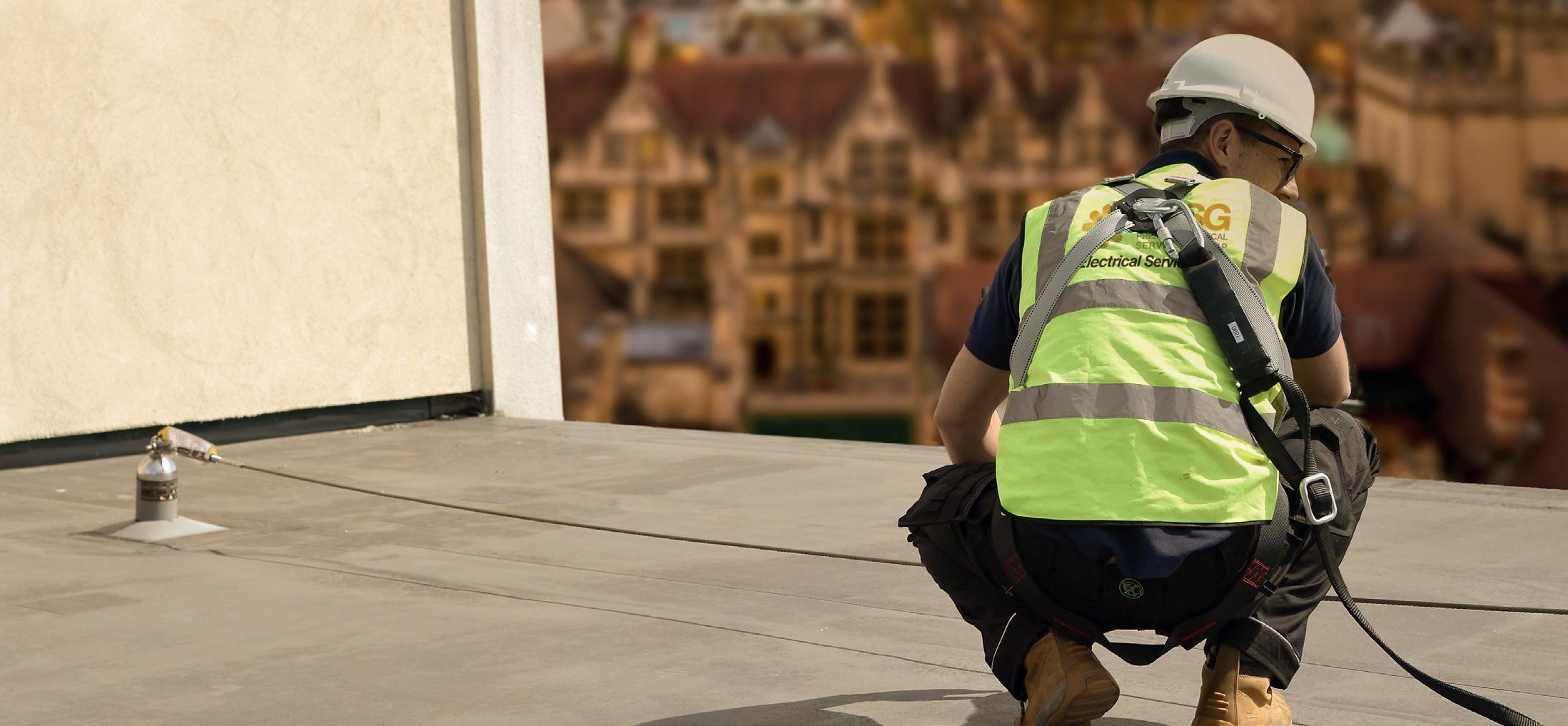
At 3:47am on a Tuesday, a lightning strike hits a data centre in Manchester. Within milliseconds, protective systems activate, power reroutes seamlessly and 50,000 businesses continue operating without ever knowing how close they came to digital disaster.
This isn’t luck. This is what happens when critical infrastructure is protected by specialists who understand that in the digital economy, there’s no such thing as acceptable downtime. From hyperscale cloud providers to national telecommunications networks, these environments demand specialist expertise that goes far beyond conventional facilities management. When systems fail, the consequences ripple across entire industries, affecting everything from online banking to emergency services.
Premier Technical Services Group Ltd (PTSG) has established itself as a critical partner for operators managing these mission-critical facilities. With over 3,000 certified engineers and specialist capabilities spanning electrical systems, fire protection, water treatment and building access services, PTSG delivers what it calls “total facility protection” – integrated solutions that ensure every aspect of a site operates safely, compliantly and efficiently.
“Data centres and telecoms facilities can’t afford to take chances,” explains Tracy Spendlove, Sales Director at PTSG. “These environments require specialist knowledge and the ability to deliver multiple services through one trusted partner. Our bundled services approach means facilities managers get complete coverage without the complexity of managing multiple contractors.”
When connectivity cannot fail
PTSG’s work with British Telecom demonstrates the scale and critical nature of telecommunications infrastructure protection. As the UK’s largest fixed-line and broadband provider, BT operates approximately 28 million telephone lines across Great Britain and maintains the Universal Service Obligation, ensuring every address in the UK can access fixed telephone services. When lightning strikes telephone exchanges or transmission equipment, the impact can affect thousands of customers and critical services. PTSG engineers deliver specialist lightning protection repairs across BT’s extensive site network, ensuring the infrastructure that keeps the UK connected remains resilient against atmospheric discharge.
“Lightning protection in telecoms isn’t just about protecting equipment,” says Spendlove.
“It’s about protecting the connectivity that modern society depends on. Every repair we complete helps maintain the network reliability that businesses and emergency services rely on.”
Manchester data centre: precision under pressure Manchester’s position at the intersection of the UK’s figure-ofeight fibre-optic network makes it a strategic hub for data centre operations. With 20 colocation facilities already established, the city represents a critical node in the UK’s digital infrastructure.
PTSG recently completed a major lightning protection and earthing installation for a multinational Tier 1 construction company at a Manchester data centre. The project required rapid mobilisation and precise coordination to avoid any disruption to the facility’s operations.
Site visits and design finalisation were completed within a week, with all issues addressed and full sign-off achieved. The project’s foreman received a monthly safety award, highlighting PTSG’s commitment to maintaining the highest standards even under tight deadlines.
“Data centre projects demand absolute precision,” explains Spendlove. “There’s no room for error when you’re working around infrastructure that powers thousands of businesses. Our ability to mobilise quickly from our 50 plus nationwide locations means we can respond immediately when critical facilities need us.”
Beyond the visible: comprehensive facility protection
While lightning protection and electrical systems often grab attention, PTSG’s integrated approach addresses every aspect of data centre and telecoms facility management. The company’s five core service divisions work together to deliver comprehensive protection:
Electrical services: Lightning protection, earthing systems, fixed wire testing and emergency lighting – ensuring power infrastructure operates safely and reliably under all conditions.
Fire solutions: Advanced fire suppression systems, passive fire protection and compartmentation designed specifically for environments containing sensitive electronic equipment and critical infrastructure.
Water treatment: Legionella control, water quality monitoring and specialist hygiene services that protect both personnel and equipment in facilities where water cooling systems are essential for operations.
Access and safety: Installation and maintenance of fall protection systems, suspended access equipment and safety compliance for engineers working at height on towers, masts and rooftop equipment.
Building access specialists: Specialist cleaning and maintenance services, including graffiti removal and facade restoration that maintain the professional appearance expected of mission-critical facilities.
Cleaning up the digital landscape
Even the most sophisticated data centres face everyday challenges that require specialist solutions. PTSG recently delivered graffiti removal services at a TalkTalk data centre in Brentford, Middlesex, working on behalf of CBRE’s Data Centre Solutions division.

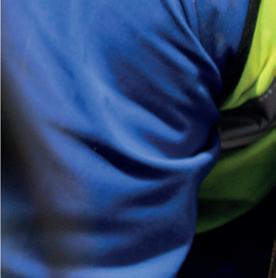
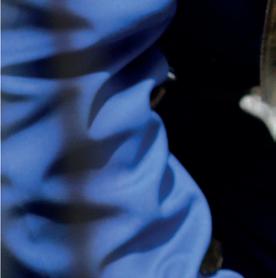
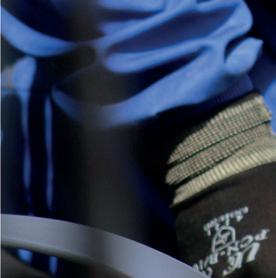
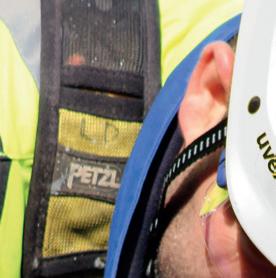
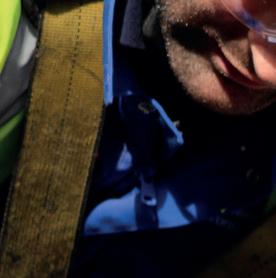
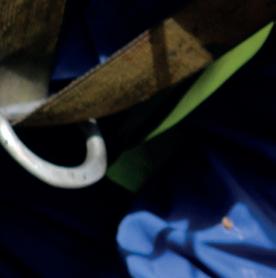
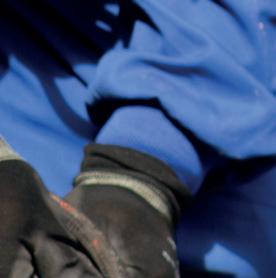

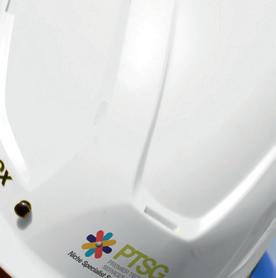
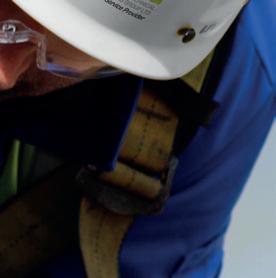

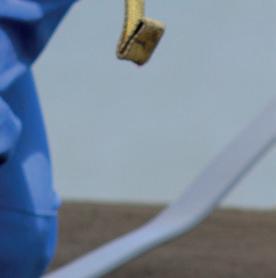





Using mobile elevating work platforms and specialist removal products, PTSG’s building access specialists restored the facility’s facade after vandalism. The team conducted test samples before starting work to ensure complete client satisfaction – a standard approach that reflects the precision required in sensitive environments.
“Appearance matters in data centres,” notes Spendlove. “These facilities often host client visits and represent significant investments. Our building access specialists understand that every service, from major system installations to facade cleaning, must be delivered to the same exacting standards.”
Integrated services: the competitive advantage
PTSG’s strength lies in its ability to deliver multiple specialist services through a single partnership. Rather than managing separate contractors for electrical work, fire protection, water treatment and building maintenance, facilities managers can access all these capabilities through one provider.



The data centre industry is moving towards consolidation of suppliers
This integrated approach delivers several critical advantages for data centre and telecoms operators:
Reduced complexity: One point of contact for all specialist services, eliminating coordination challenges between multiple contractors.
Enhanced compliance: Consistent standards and documentation across all services, with integrated reporting through PTSG’s Clarity digital platform.
Improved response times: 24/7 emergency response capability across all service lines, with engineers who understand the critical nature of these environments.
Cost efficiency: Bundled services that reduce overhead costs and eliminate the premium typically charged for emergency callouts by multiple specialists.
“The data centre industry is moving towards consolidation of suppliers,” explains Spendlove. “Operators want partners who can handle everything from routine maintenance to fire safety. Our bundled services approach gives facilities managers the simplicity they need while maintaining the specialist expertise these environments demand.”
Digital visibility and accountability
PTSG’s proprietary Clarity platform provides facilities managers with real-time visibility across all services and sites. From lightning protection test results to fire system certifications and water quality reports, everything is accessible through a single dashboard.
“Transparency is critical in mission-critical environments,” says Spendlove. “Facilities managers need to know exactly what’s been done, what’s due and what needs immediate attention. Clarity gives them that visibility across all our services.”
The platform’s photographic evidence, compliance tracking and automated reporting help facilities managers demonstrate regulatory compliance while maintaining complete oversight of their service portfolio.
Future-proofing critical infrastructure
As the UK’s digital infrastructure continues to expand, with increasing demand for edge computing, 5G networks and cloud services, the pressure on facilities managers intensifies. New technologies bring new challenges, from higher power densities to more complex cooling requirements.
PTSG’s commitment to continuous development ensures its services evolve alongside industry demands. From advanced fire suppression systems designed for high-density server environments to lightning protection optimised for 5G equipment, the company invests in the expertise needed to protect tomorrow’s infrastructure.

“The digital economy depends on physical infrastructure that must be protected by specialists who understand both current requirements and future challenges,” says Spendlove. “Our role is to ensure that as technology advances, the facilities housing it remain safe, compliant and resilient.”
The foundation of digital reliability
Data centres and telecommunications facilities represent the invisible foundation of modern life. Behind every online transaction, video call and emergency service response lies physical infrastructure that must operate flawlessly.
PTSG’s mission-critical approach ensures these facilities receive the specialist protection they demand. From lightning protection that safeguards against natural threats to fire systems that protect billion-pound investments, every service is delivered with the understanding that failure is not an option.
For facilities managers responsible for keeping the UK connected, PTSG provides the expertise, integration and reliability that missioncritical operations demand. In a sector where downtime is measured in millions, having the right partner makes all the difference.
“Data centres and telecoms facilities can’t afford to take chances. These environments require specialist knowledge and the ability to deliver multiple services through one trusted partner.”
For more information email Tracy Spendlove at tracys@ptsg.co.uk or visit www.ptsg.co.uk
Data centres and telecoms facilities can’t afford to take chances. These environments require specialist knowledge and the ability to deliver multiple services through one trusted partner



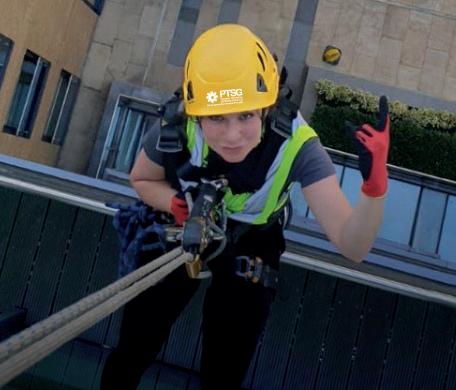











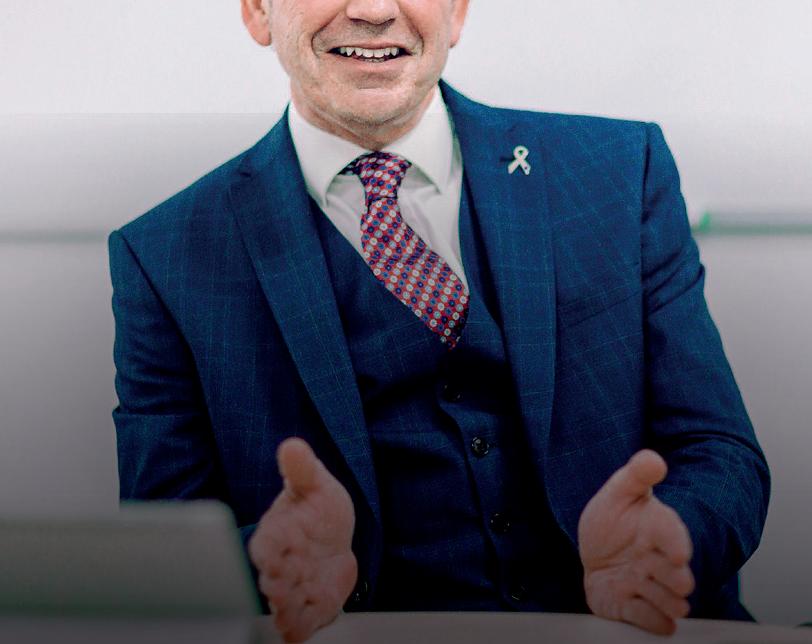


Behind the closed doors: Building the future of healthcare FM
FM Director recently caught up with Wayne Goldsmith, Managing Director of the Health & Care Division at CBRE to discuss his journey through the FM industry. CBRE GWS manages 20 million SQFT of healthcare space managed in the UK for private and NHS, maintains over 150,000 healthcare assets and oversees 550+ people in the UK Health & Care division. Wayne talked us through the unique challenges of healthcare facilities management, as well as his vision for attracting the next generation to this rewarding sector
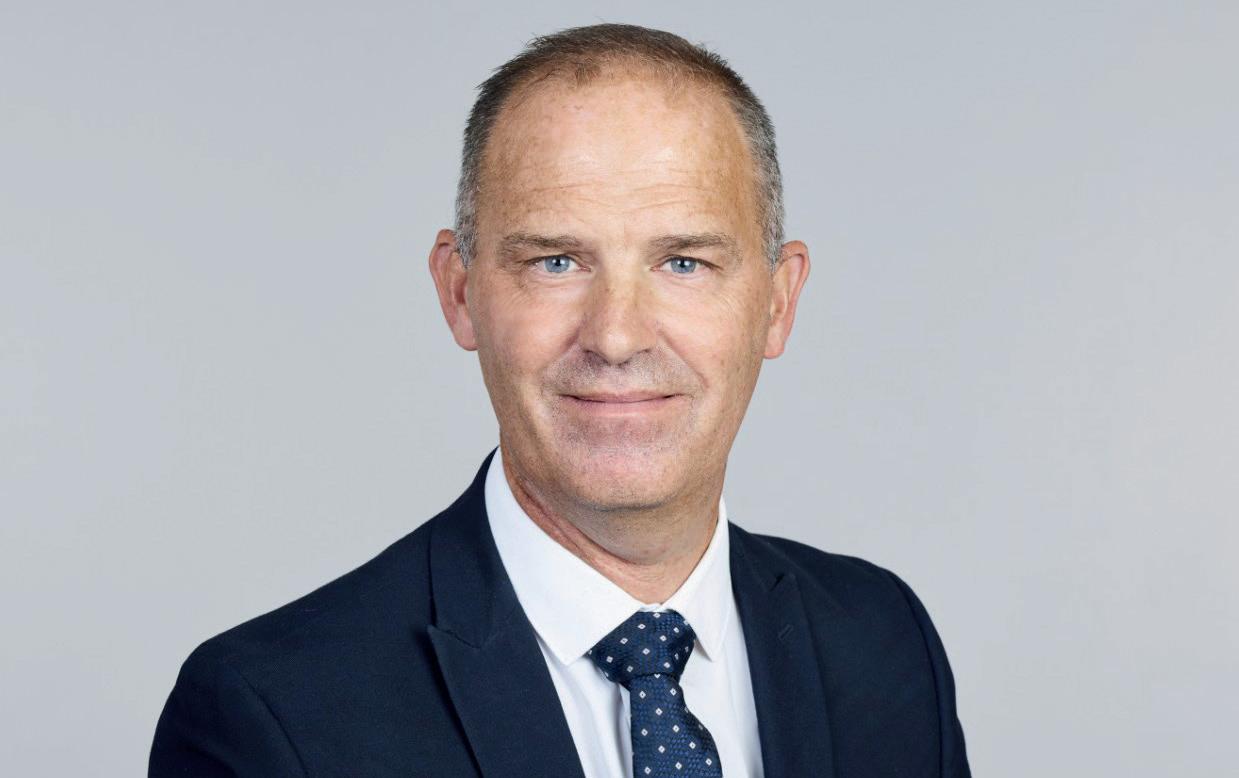
Like many in the facilities management industry, Wayne Goldsmith’s career path was far from planned. After nearly two decades in the sector, he has worked across diverse environments from aviation to healthcare, discovering along the way that FM offers something truly unique: access to the extraordinary.
“It’s one of those careers that you never sit in school thinking, ‘I know I’m going to work in FM,’” Wayne reflected. “Most people just fall into it, and my circumstances are no different.”
His journey began when a previous boss offered him an opportunity with a large organisation, leading to a role managing Heathrow Airport.

From there, his career evolved through the interconnected nature of the FM industry, taking him across manufacturing, industrial sectors, central government, transport, and aviation.
A calling in healthcare
Four years ago, CBRE approached Wayne about leading their healthcare sector. Whilst he had some previous healthcare experience, it wasn’t his main background. However, the opportunity to contribute to a sector in desperate need of support proved irresistible.
“It was a great opportunity to give back to a sector that was in desperate need of support,” Wayne explained. “It’s a great place to be able to create new talent, create apprenticeships and graduates in an environment that is so rewarding.”
Under Wayne’s leadership, CBRE expanded their healthcare offering beyond traditional hospital services to encompass the full care continuum. He recognised the seamless transition opportunities between acute hospital care, community care, and the care sector.
“We support the hospitals, which is great, but actually it’s the community and then the secondary care within the care sector –it’s a real seamless transition,” Wayne said. “Speaking to many hospital directors, they say around 40% of all patients could leave if there was somewhere for them to go into a care environment.”
This holistic approach reflects Wayne’s belief in supporting local communities through local jobs, local suppliers, and accessible healthcare provision. “People don’t need to go to hospital for an appointment if we can do it in a local environment, within one to two miles of your home – it makes that much easier,” he added.
The rewards of FM
Wayne’s enthusiasm for the industry is infectious, particularly when discussing the unique access FM provides to extraordinary environments.
Throughout his career, he has been behind scenes that few others see: control towers at Heathrow, rail operating centres managing train networks, military installations, and even the Old Scotland Yard stables.
“You see behind the closed doors,” Wayne said. “It’s phenomenal, absolutely phenomenal, and I love it to bits.”
This passion drives Wayne to visit schools and career fairs, spreading the word about FM opportunities.
He emphasises that at a global organisation like CBRE, the possibilities are vast – from UK-based roles to opportunities across Europe, APAC, and America.
“While you might do something here in the UK, in two to three years’ time you could be doing something in Europe, APAC, or America because our model mirrors every country,” Wayne explained.
It was a great opportunity to give back to a sector that was in desperate need of support

Attracting the next generation
For Wayne, attracting young talent requires early education about the industry’s possibilities. He advocates for both graduate programmes and FM apprenticeships – not just engineering apprenticeships, but comprehensive FM training that encompasses market analysis and strategic thinking.
“We need that next generation of thinking to challenge people like myself,” Wayne said. “Why do you do it that way? Well, because you’ve always done it that way. Or have you thought about doing it this way? That fresh thinking is what will make us stand out in the years to come.”
Wayne believes the industry needs to better publicise its successes.
“We always seem to be blamed if something goes wrong, but there are so many good things going on that we need to highlight to the younger generation,” he observed. “The AI and smart technology that goes along with it is exciting – some of the stuff we do is really clever, and we need that next generation to see it.”
Healthcare challenges
The healthcare sector presents unique challenges that Wayne and his team navigate daily. The most significant is the ageing estate, with backlog maintenance and chronic under-investment in properties accumulated over years.
“Changing governments can kick that forward, but it can also stifle progress,” Wayne noted. “When we went through the general election last year, budgetary controls were frozen for the right reasons, but that allows the backlog to build up even more.”
Resource challenges extend beyond buildings to people. Wayne acknowledges that healthcare FM isn’t suitable for everyone, as staff may encounter upsetting situations. This requires careful recruitment and education to ensure people understand what they’re signing up for.
The sector also demands enhanced compliance standards. Beyond industry regulations, healthcare FM must meet Healthcare Technical Memorandums (HTMs) – elevated standards designed to protect vulnerable patients with suppressed immune systems.
“We need to ensure that highest level of compliance is definitely there because patients are vulnerable,” Wayne emphasised.
Looking ahead
For the next three to five years, Wayne sees several key priorities. Developing the next generation of engineers remains crucial, as does leveraging AI and smart technology to transform healthcare facilities.
“If we took one of our hospitals that we look after, probably built in the early 1900s, how do we take that building and make it smart and efficient to reduce energy consumption?” Wayne asked. “We’ve got to challenge the sector and say we can do this smarter.”
The challenge lies in implementing these improvements in live environments. “We can’t close hospitals, so how do we do it at very low risk to implement the changes that are necessary?”
Wayne’s personal mantra – “people, customers, then growth” –reflects his belief that getting the right people with the right skill sets into the right jobs creates lasting success. “If I get that right, they’ll love it and they’ll stick around. It’s an industry where people stick around for a long time because it’s so diverse and rewarding in so many ways.”
For now, Wayne remains committed to driving growth in CBRE’s health and care sector in the UK, continuing to demonstrate that facilities management offers not just a career, but access to an extraordinary world behind the closed doors that most never see.
ECO Property Maintenance is an environmentally friendly and cost-effective way to bundle non-business critical jobs of compatible trades.
It is a simple way to reduce the number of attendance fees and lower your carbon footprint for non-urgent works such as minor repairs or minor decorative fixes.
For more information contact info@msl-ltd.co.uk
HOW IT WORKS
Low urgency maintenance issues at the same site are grouped as Eco tasks and stored on the inSYNC portal for up to 21 days.
inSYNC recognises compatible trade tasks and calculates estimated labour timescales to complete.
Any of the following three triggers then apply: A standard priority job is raised - any compatible Eco tasks are bundled to this work order.
Four estimated labour hours are reached to complete compatible Eco tasks - one bundled work order is created
21 days are reached - one bundled work order




How the concierge guard is changing security
By Timothy Isaac, National Security Advisor, 14forty
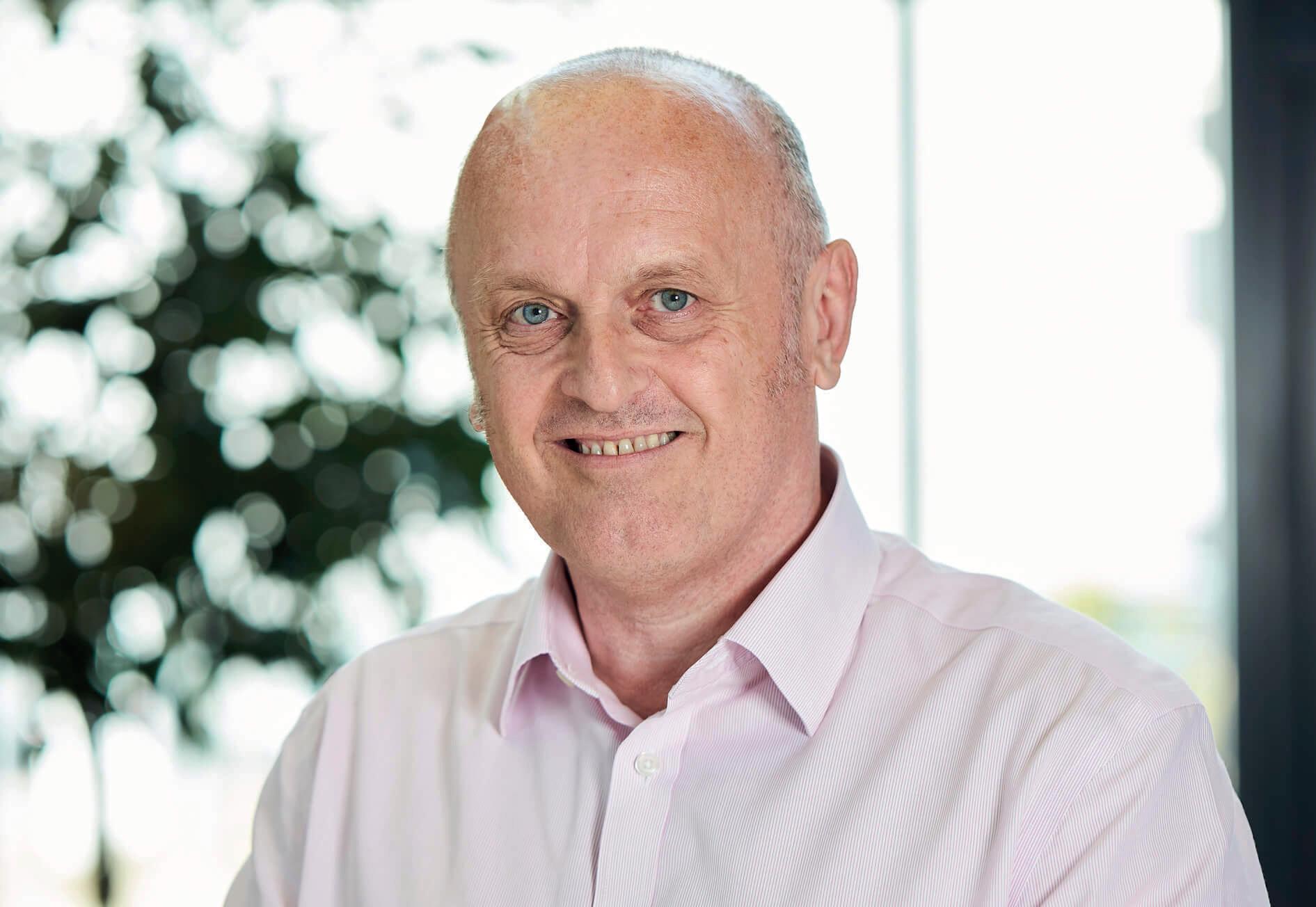
Security is a fast-changing, fast-moving industry at any time as threats evolve and trends emerge, but the rise of the concierge security guard has potential to change things for the long term.
For a long time now in the UK, the role of a security guard has been shifting, especially in the commercial sector.
There are many reasons for that - ranging from the emergence of recent technology to a complex recruitment market and different demands from clients in the modern world.
The latest trend has been to shift the nature of the role in order to attract and upskill talent to provide a better service for clients.
Instead of looking for traditional security guards, there is a new focus on multi-skilling, with technology taking over some of the more menial tasks associated with security.
At 14forty, as an integrated FM services provider, we often look after all aspects of a building’s facilities management – from security to guest services and from cleaning to catering and even grounds maintenance.
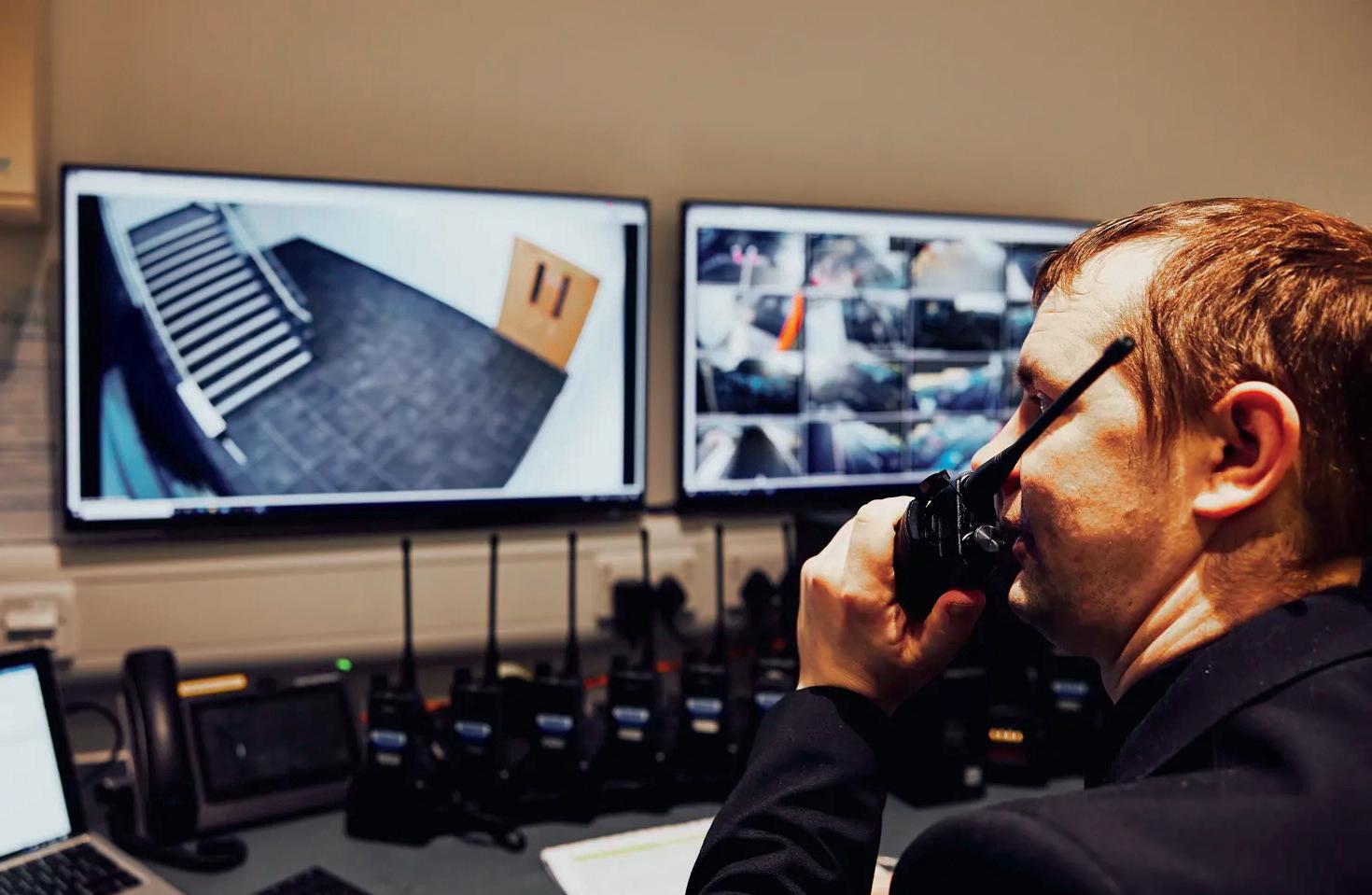
It makes sense to include multi-skilled personnel as part of that mix. It provides them with a range of skills and training and supports our clients with an overall proposition.
What is a security concierge?
Security concierges are responsible for security, access control, surveillance, patrols and emergency response. This provides our people with an amazing skillset, to develop their careers.
They also have a hospitality focus and are trained in customer service. This means they may take on roles such as greeting and assistance or reception duties, acting as the first point of contact for guests and visitors as well as providing a warm welcome and assistance.
In some cases, they may offer personal concierge assistance, such as booking taxis, arranging deliveries, or providing information about the building and surrounding area.
Benefits include enhanced security, improved customer service and having versatile, multi-skilled personnel on site.
It’s about hiring people with the right attitude and then helping them to train and thrive on the job, providing the skills to be experts within their chosen careers.
So, does it work? In our experience it does. We’ve had countless comments from clients saying that visitors are impressed by the greeting they had from the person on the gate.
Some were happy the guard remembered their name from a previous visit.
Or say they went the extra mile to solve a problem for them. Or they just enjoyed the conversation. It’s all part of the skills of a concierge guard.
Guards also need to be qualified in keeping people safe, of course, this is not a dumbing down of the role but an elevation of it – and training is crucial to delivering a good service.
In addition, technology is used to support teams on the ground, for instance AI-enhanced cameras, which are making a significant difference. These can be used to support other manned services, for example in a derelict site.
This is a mode, security concierge and technology combined, that we expect to experience significant growth in future through continued investment and people training.
It’s about hiring people with the right attitude and then helping them to train and thrive on the job
Uncompromising Standards: The Value of a FASET Member

When selecting a contractor for temporary works and safety netting, competence and safety are non-negotiable. This is why partnering with a FASET member offers unparalleled assurance.
As the industry leader for safety and quality standards in height safety, FASET is proud to be accredited by UKAS (United Kingdom Accreditation Service) against the BS EN ISO/IEC 17020:2012 standard and the latest SSIP (Safety Schemes in Procurement) rules.
This accreditation means that FASET’s auditing processes meet the highest standards for impartiality and competence. The UKAS logo on every FASET membership certificate is a powerful symbol of trust and reliability, giving clients and main contractors the confidence that they are working with a company that is committed to working competently.
Audited for Technical Competence and Commercial Capability
Every FASET member undergoes a rigorous application process and an annual, independently assessed Business Management Audit.
This audit, recognised by both UKAS and SSIP, meticulously examines a member’s business operations to confirm their quality and unwavering commitment to best practice in areas such as financial and legal, Corporate Social Responsibility, Health, Safety and Environmental.
FASET Members then move to the second stage of the audit that assess their technical competence, so that end users can be sure they can do the work they say they can. The CDM and Work at Height Regulations mandate that clients must employ competent contractors. By choosing a FASET member, you are directly addressing this requirement.
You are engaging with a company that has been independently verified to possess the technical and commercial capability to deliver work that meets industry standards exceeds them.
The Benefits of Choosing a FASET Member
Using a FASET member goes beyond simply meeting compliance requirements; it provides significant benefits to your projects:
Enhanced Credibility: You are working with a certified contractor whose commitment to safety and quality is proven through a UKAS-accredited process.
Industry Confidence: The UKAS logo provides a clear mark of trust, reassuring all stakeholders.
Compliance with SSIP: FASET’s accreditation simplifies procurement processes, ensuring a smoother start to your project.

FASET Managing Director Tony Seddon commented, “Our UKASaccredited audit is what truly sets our members apart. It provides an independent, third-party verification of their technical competence and commercial capability.
“When a client chooses a FASET member, they are not just getting a service; they are securing peace of mind, knowing they have chosen a contractor who has been rigorously vetted to the highest standards.”
By choosing a FASET member, you are not just hiring a contractor; you are aligning your project with a community that upholds the highest integrity, safety, and innovation in the industry.
The Choice is Working at Height, Safely.
Don’t take chances—choose a FASET Member.
When you need a competent contractor who adheres to the highest safety standards, a FASET member is the right choice. Our members are committed to excellence, as proven by their annual UKAS and SSIP-accredited audit
They are not just following the rules; they are shaping them. FASET members work collaboratively to create industry-leading guidance and influence the future of work at height regulations.
You can easily verify a member’s credentials using their FASET card, which clearly shows their qualifications and training.

Partner with a FASET member and make safety your number one priority. Find your FASET registered contractor here
Advocating industry-wide change: behind PERI UK’s temporary works training
As construction projects grow more complex and safety standards tighten, PERI UK’s field services manager Terry Hall is on a mission to professionalise industrial training. Leading temporary works training programmes, including the only accredited formwork training courses in the UK, he is enhancing the skills – and confidence –needed to build better
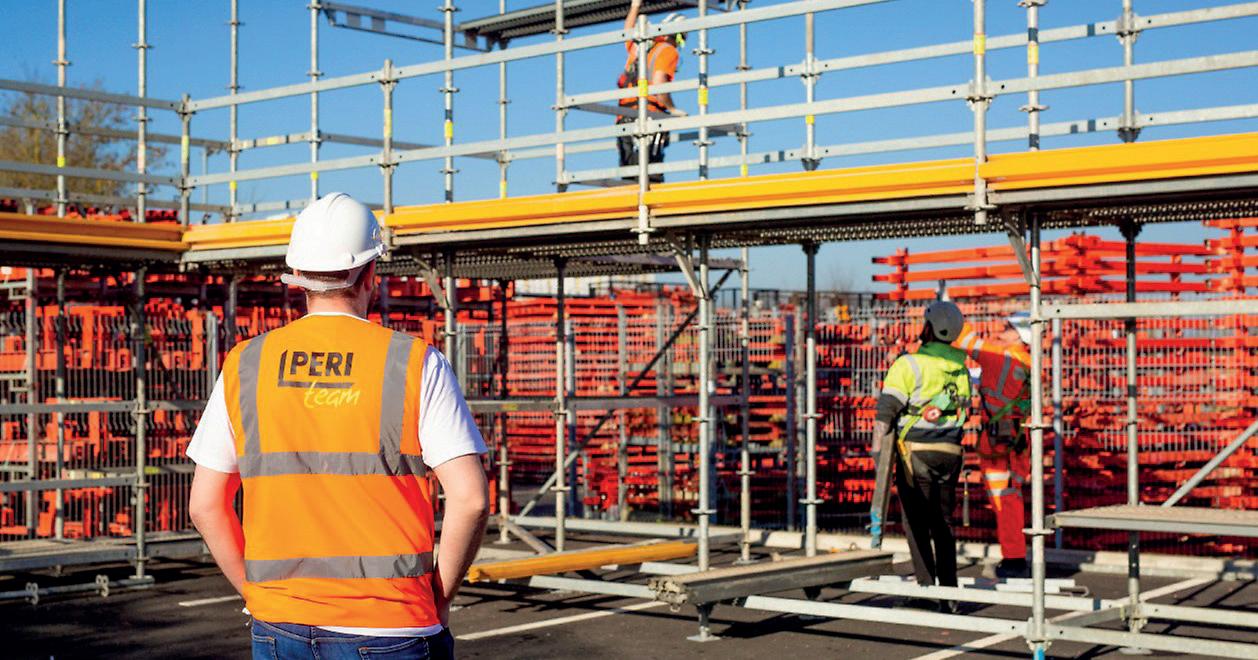
Modern construction demands towering skyscrapers rise from the ground with inchperfect precision – driven by efficiency, productivity, and sustainability, making the need for competent, safety-conscious operatives ever greater.
Improving site safety and operational efficiency in the UK’s system formwork and scaffolding sectors is Terry Hall’s top priority. Terry is a field services manager at PERI UK, providing accredited, hands-on training and support to both novice and experienced professionals.
“PERI UK is the only company currently offering accredited formwork training of this kind,” Terry states. “And it’s long overdue that the industry catches up.”
The man behind the mission
With over three decades of experience in formwork carpentry, supervision, and instruction, Terry embodies a blend of deep practical knowledge and a strong commitment to improving industry practices. His journey from apprentice carpenter to a twice-nominated CONSTRUCT Unsung Hero spearheading PERI’s accredited training programme reveals both a dedication to systemic safety and a sharp understanding of the risks involved in formwork and scaffolding. Terry’s goal is to ensure that only individuals with a recognised, formal qualification are authorised to erect temporary works systems. This commitment is reflected in his efforts to introduce clear competency measures in the areas of formwork and falsework. He believes that by introducing mandatory, regulated training, the industry can make meaningful strides in reducing serious accidents and injuries.
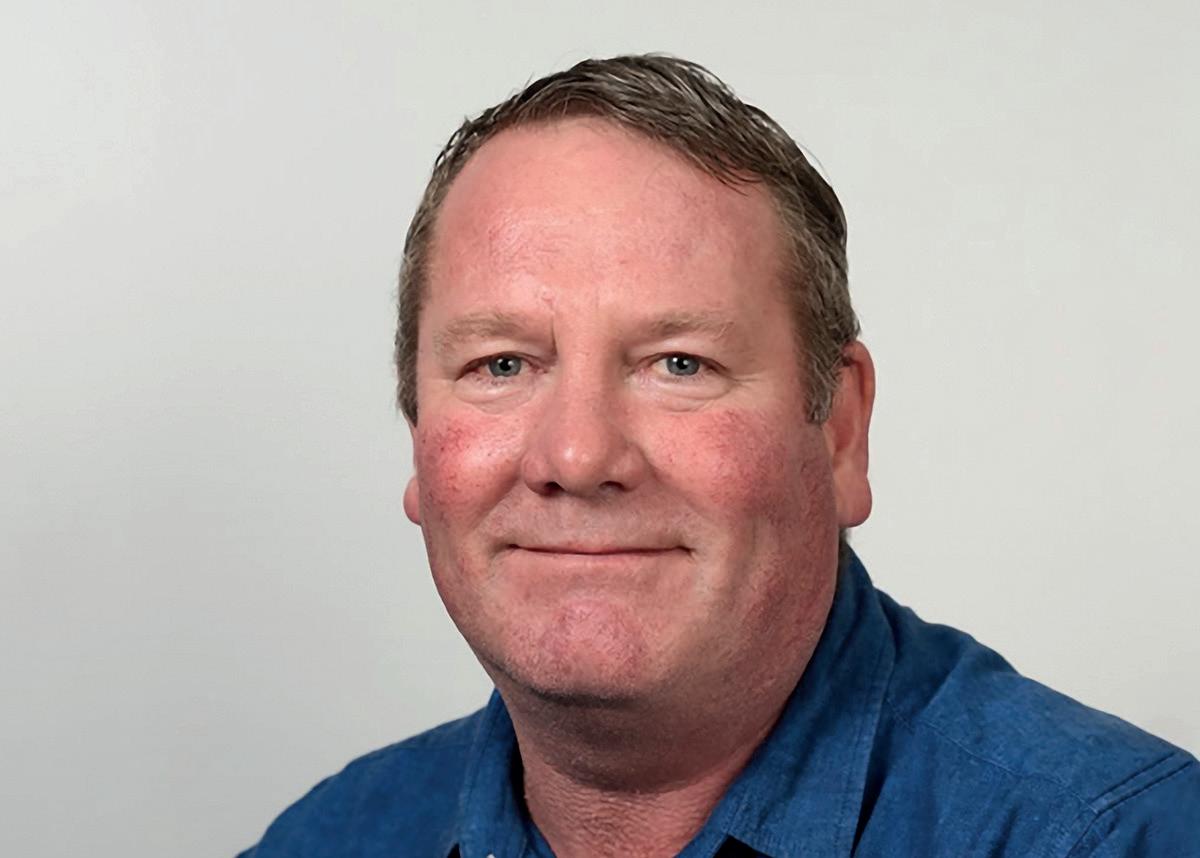
“There’s no other construction activity where you can use specialist equipment without any formal training,” says Terry. “Electricians can’t work without qualifications, and site operatives shouldn’t use complex, multi-tonne climbing systems for formwork and scaffolding without ever being shown the right way to do it. It’s dangerous.”
Bridging the industry’s skills gap
PERI UK’s training programme was developed in response to this challenge. PERI UK is now an approved centre by the CITB (Construction Industry Training Board) for formwork and has accreditation from the CISRS (Construction Industry Scaffolders Record Scheme) for system scaffolding.
PERI UK offers bespoke formwork and falsework training, accredited by UK industry body AIM, according to necessity and related to working at height, plus scaffolding courses from basic erector to advanced scaffolder and inspection.
The courses are delivered by a team of experts and can be carried out at any PERI UK depot, PERI’s Brentwood training facility, or other designated location. Successful participants receive certification from an awarding body and have the qualification linked to their CSCS (Construction Skills Certification Scheme) card, providing instant proof of competence on-site.
“When a site manager scans your CSCS card, they can see immediately that you’ve had proper training,” explains Terry.
Straight from the classroom
Terry believes training should be grounded in real-world experience and delivers all of his courses with this approach.
Having worked hands-on with PERI’s systems as a site supervisor for five years before stepping into his managerial role, he understands the challenges that only practical experience can reveal.
The most rewarding thing is when someone who’s been in the industry for years comes up to me after a course and says, ‘I never knew that, thank you.’
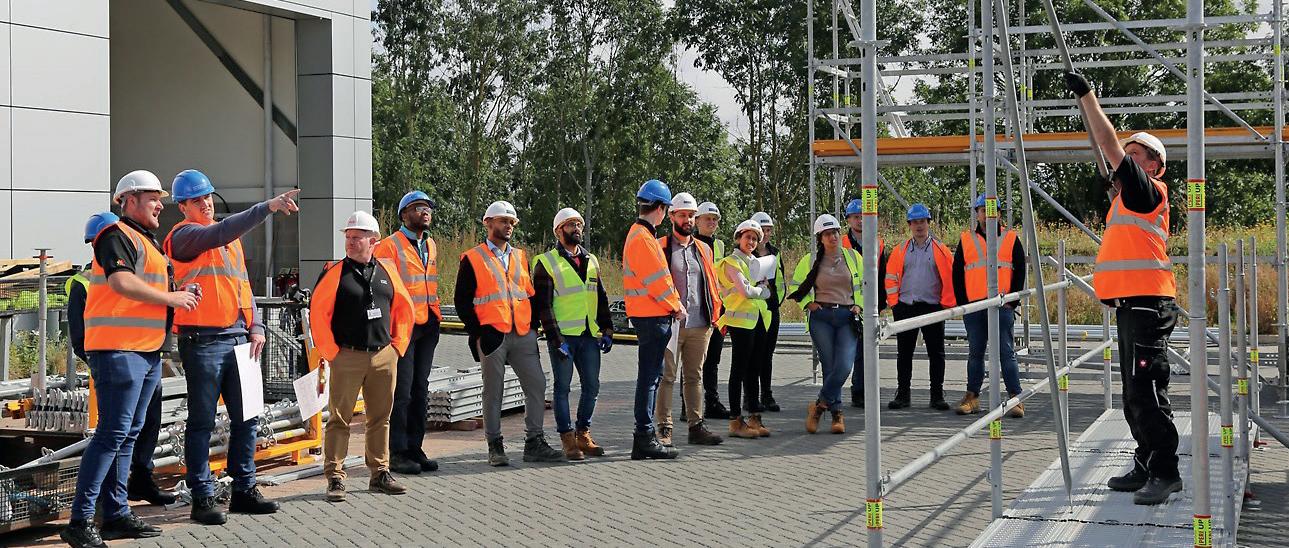
“I always assume learners have never used the systems before,” Terry says. “Some have, some haven’t, but I treat every session as a blank slate to make sure nothing is missed.”
Training figures continue to rise each year, with 2024 marking a record high for PERI UK, up 50% from the previous year. In total, Terry has trained nearly 600 individuals in his career, but the impact goes beyond numbers: “The most rewarding thing is when someone who’s been in the industry for years comes up to me after a course and says, ‘I never knew that, thank you.’ That’s when I know we’re making a difference.”
A typical course spans a minimum of two days with additional tailored support available on request. PERI’s courses blend handson instruction with theory-based workbooks.
With new systems constantly being introduced, Terry also regularly trains alongside designers and engineers from PERI’s global teams to remain ahead of industry evolution, and is consistently involved in meetings held by CONSTRUCT, the organisation which acts as an interface between member contractors, clients and suppliers to improve safety and efficiency and identify best practice and buildability.
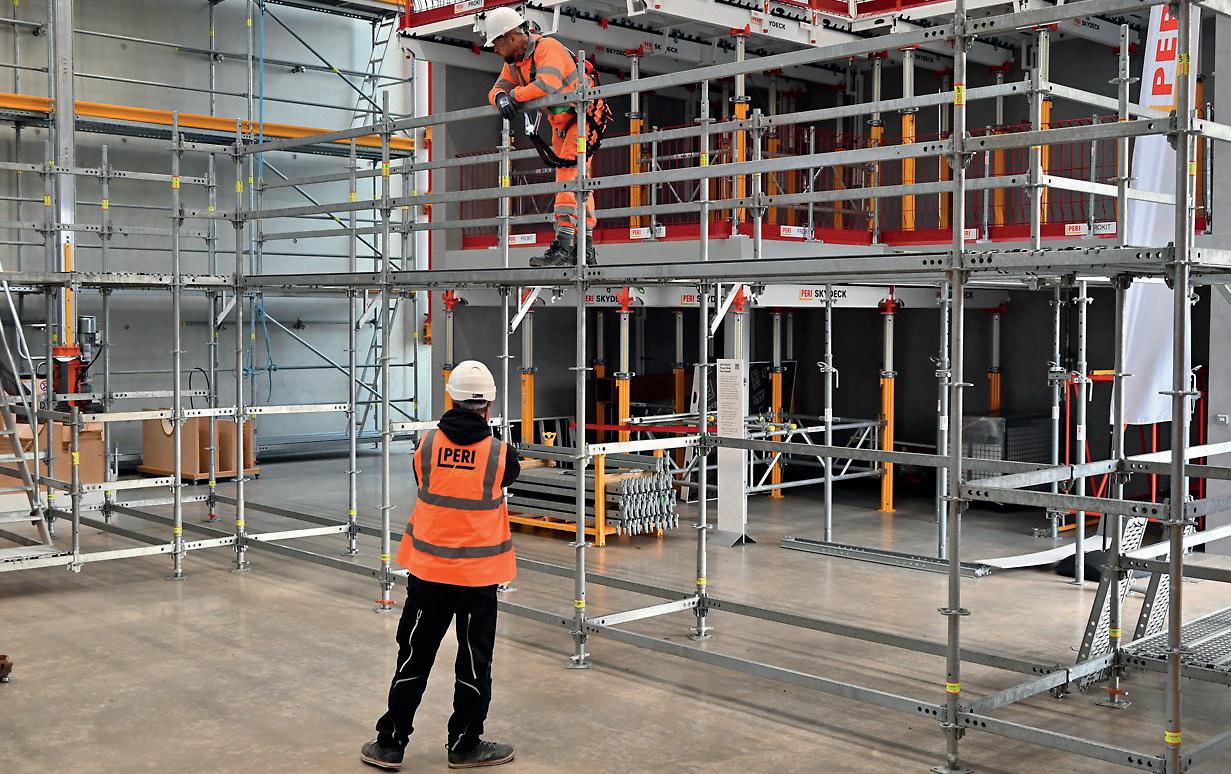
PERI’s training is increasingly being built into projects from the outset. As Terry explains, major contractors are beginning to require proof of competence before permitting operatives on high-risk tasks such as climbing formwork assembly.
“On many projects PERI is involved in, training is embedded into the package,” Terry explains. “We’re supplying the equipment, the drawings, the supervision, and the accredited training. That gives our client confidence that everyone knows what they’re doing and why.”
Driving change, one trainee at a time
While PERI advocates for wider industry adoption of accredited formwork training, it currently remains the only provider offering this level of formal instruction. In an industry that can be slow on the uptake, Terry and PERI are proving that transformation doesn’t always begin at the top.
Sometimes, it starts with someone on the ground, quietly raising the bar until the rest of the industry has no choice but to catch up.Beyond the manuals and lifting diagrams, Terry sees each session as a way to embed safer habits across the industry. Whether teaching apprentices or experienced operatives on cutting-edge hydraulic systems, each training session is a chance to build safer habits.
“PERI UK is leading the way, but we shouldn’t be the only ones,” says Terry. “This kind of training needs to become mandatory across the board.”
“But it’s not about pointing fingers,” he adds. “It’s about keeping sites and people safe.”And the industry is listening. Several contractors have gone from post-incident training to proactive upskilling across their workforce. The long-term benefits speak for themselves: fewer accidents, more efficient builds, and improved reputation.
Looking ahead
As construction projects become more complex, Terry and the PERI training team’s role evolves. They are currently involved in training operatives on PERI’s latest climbing system, being used for the first time worldwide on a UK site, as well as mentoring the next generation of trainers to expand capacity and consolidate an industry where system formwork training is as mandatory as scaffolding certifications, and where site safety is never left to chance.
Terry is championing cross-functional workshops that bring together teams from across PERI UK. Whether it’s helping the yard team understand proper equipment handling or giving marketing staff a crash course in system assembly, his inclusive training approach is building a culture of competence from the inside out.
“Training improves safety, boosts productivity, and empowers the people behind the progress,” concludes Terry. “The tools are there. The knowledge is there. It’s time the whole industry caught up.”
Learn more about PERI UK training services at peri.ltd.uk/ services/training-services.html
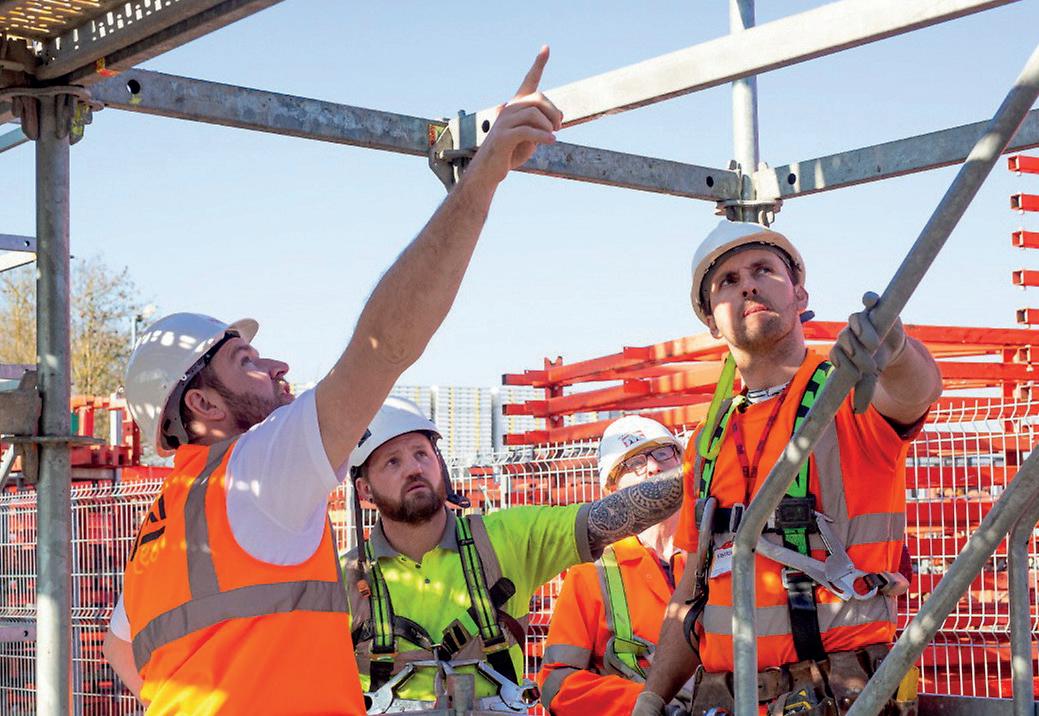
From van to boardroom: A 33-year journey through FM
When we recently caught up with Stuart Bellew, Chief Operating Officer at Q3 Services he reflected on his remarkable career journey from a young entrepreneur to managing prestigious contracts including Buckingham Palace and a leading social media company’s new London headquarters.

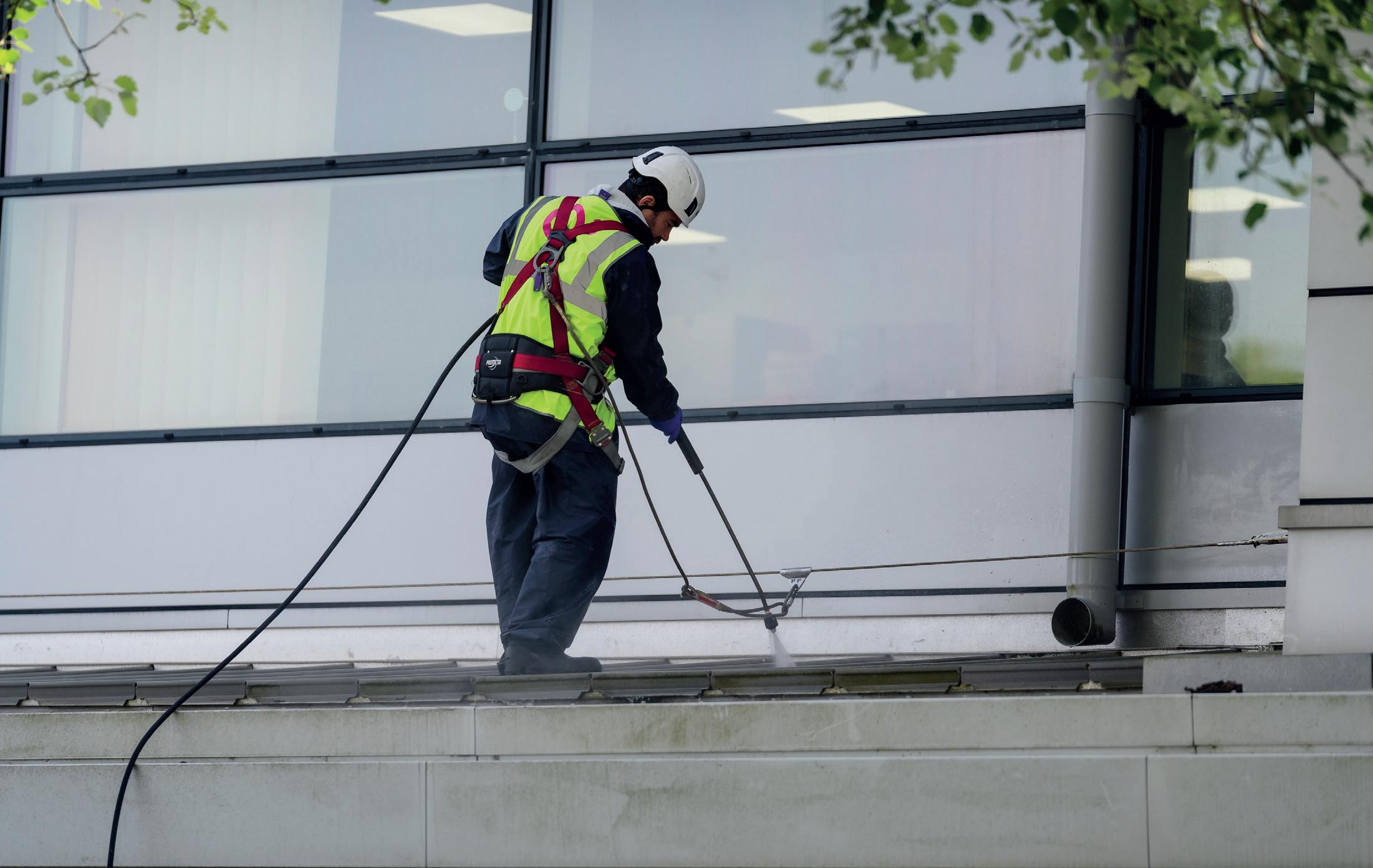
Stuart Bellew’s entry into the facilities management sector wasn’t planned. After returning from a life-changing six-month stint in California at age 18, Stuart found himself working in the local pub, uncertain about his future direction.
It was a chance conversation with a customer, Simon Dowie, who ran a cleaning company that would set the course for what would become a 33-year career, spanning some of the UK’s most prestigious contracts.
“I started doing a bit of casual work with Simon and quite enjoyed it,” Stuart recalled. “When he wanted to go off travelling, I ended up buying his company, Hampshire Office Cleaners, which came with a number of contracts. That’s how I started my journey in cleaning back in 1990.”
Building from the ground up
Stuart admitted he never expected to enter the cleaning industry. “I don’t remember being at school and saying, ‘I’m going to get into cleaning’. It’s just something I fell into, but I really enjoyed it.”
The 1990s recession, rather than hindering his progress, actually provided opportunities. Stuart took on contracts that others wouldn’t touch, including council buildings, football clubs, and car showrooms, building a business with revenues of around £400,000 and employing 100 people.
“I think where I benefited was taking a lot of accountability for my accounts. They were all quite personal to me – that was my lifeline,” Stuart explained. “If someone didn’t turn up, I would go out myself and make sure that when the client turned up in the morning, the job was done.”
The
corporate transition
After a decade of running his own business, Stuart’s life changed when he met Chris Piper, then sales director at Sodexo, during a site visit in Farnborough. Initially reluctant to give up his independence, Stuart agreed to consult for Sodexo two days a week.
“It was my first invitation into the corporate world,” Stuart said. “I’d moulded myself as a bit of a maverick because I’d done things my way for 10 years. But, Chris said he’d look after me and put me on every single training course they could.”
The transition from managing contracts worth £20,000 to those valued at millions was significant, but Stuart found the fundamentals remained the same, just on a grander scale. This experience at Sodexo led to roles at OCS and later at an events company managing high-profile venues including Wembley Stadium, Chelsea Football Club, and The O2 Arena.
If someone didn’t turn up, I would go out myself and make sure that when the client turned up in the morning, the job was done
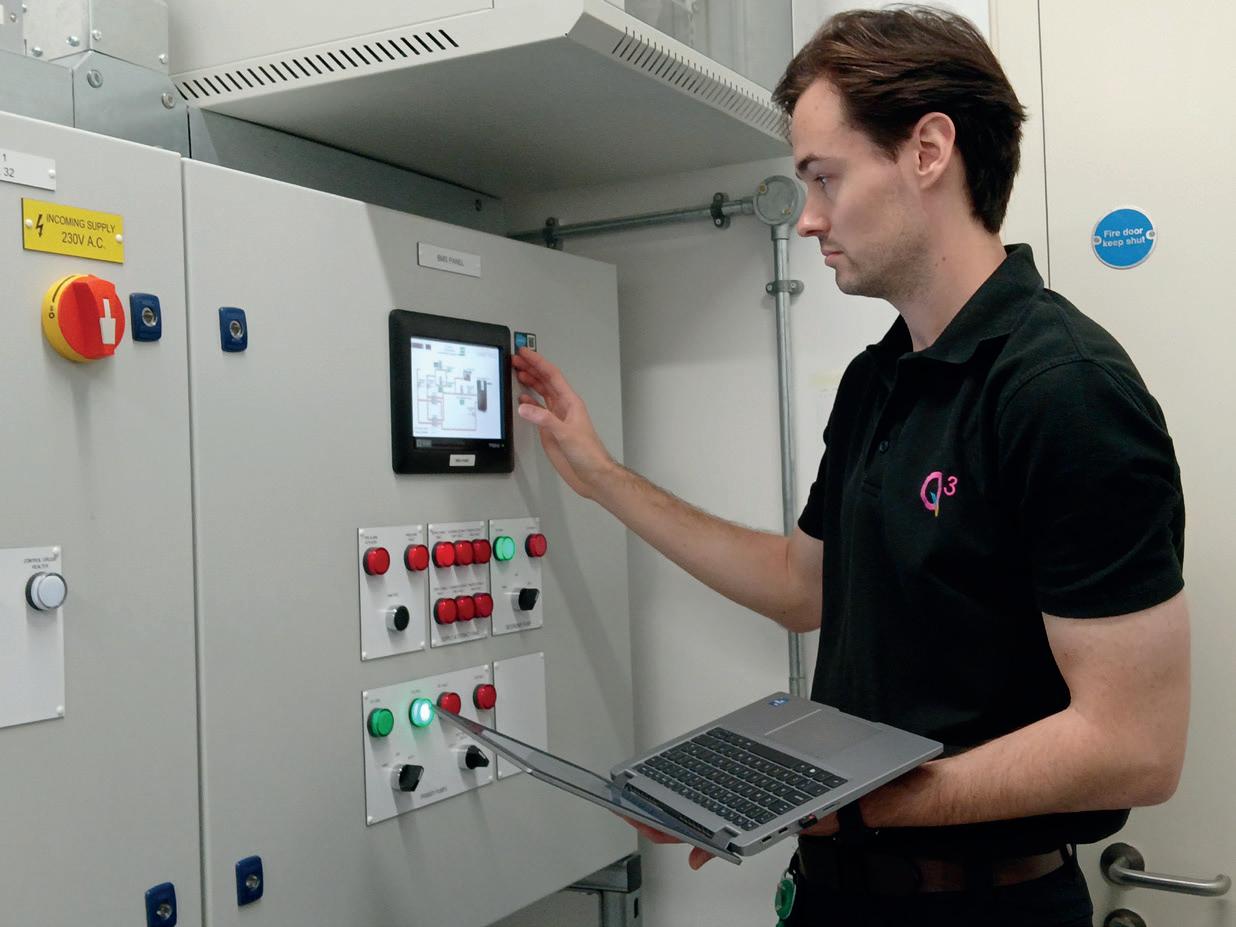
Prestigious contracts and unique experiences
Stuart’s career has been marked by exceptional contracts that have provided unique experiences. At Mitie, where he eventually managed a £270 million cleaning portfolio, he oversaw contracts including Lloyds Banking Group, Tesco, and Amazon performance centres.
However, it was winning the Buckingham Palace contract that remains a career highlight. “When I was presenting how we were going to mobilise and take it from good to great, it just happened to be 11am and the changing of the guard happened,” Stuart remembered. “It was amazing!”
Founding Q3 Services
When leadership changes at Mitie created uncertainty, Stuart received a call that would define the next chapter of his career. Martyn Freeman invited him to co-found Q3 Services.
“By the second day of me leaving Mitie, Martyn was on the phone saying, ‘Let’s start our own business,’” Stuart said. “I was very humbled by that. Out of all the people he’d worked with over his career, he chose to ring me.”
The name Q3 was chosen to represent the “three quality elements: quality clients, quality people, quality service.” Despite planning to focus on the M4 corridor, their first contract was in Barnsley! “We quickly ended up ripping up that business plan and said, ‘it will be what it will be,’” Stuart admitted.
People-first philosophy
Central to Q3’s success is its commitment to employee development and wellbeing. The company was the first to partner with the Living Wage Foundation. “We live and breathe our culture. It’s all about treating people with respect and integrity,” Stuart said. “Our staff turnover is very low.”
The company has introduced innovative employee support systems, including Daisy, a wellbeing platform that provides discounts and, more importantly, enables company-wide recognition of outstanding performance.
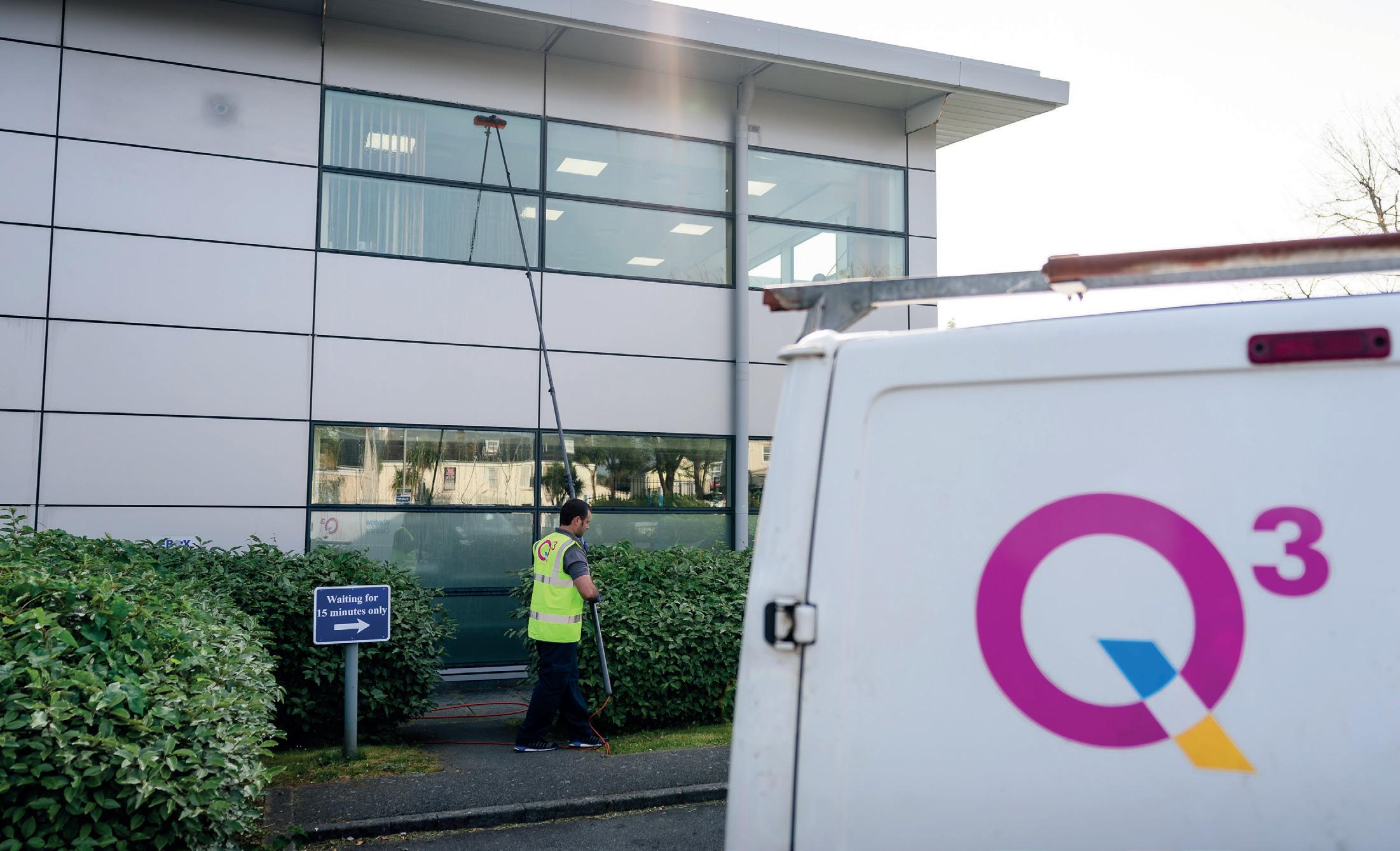
IS YOUR FIRE SAFETY JUST A PAPER EXERCISE?
BEYOND COMPLIANCE. TRUE PROTECTION.
When regulations evolve but your fire assessment doesn’t, the potential risk isn’t just that of a legal nature, it could be life-threatening.
Our qualified assessors, deliver more than paperwork, they deliver the best advice you could need
WHY CHOOSE US?






• Truly Independent Assessments – an unbiased evaluation you can trust
• PAS 79 Compliant Reporting – Meeting the highest industry standards
• The Best Expertise giving “competency” with the Accreditations and Experience the assessors hold = Piece of mind that you have adhered to your obligation within the Regulatory Reform Fire Safety Order 2005
• Actionable Recommendations – Clear guidance with clear timelines for each item noted
• Availability for Integration with the PTSG specialist group companies
– Giving a solution to all your fire needs
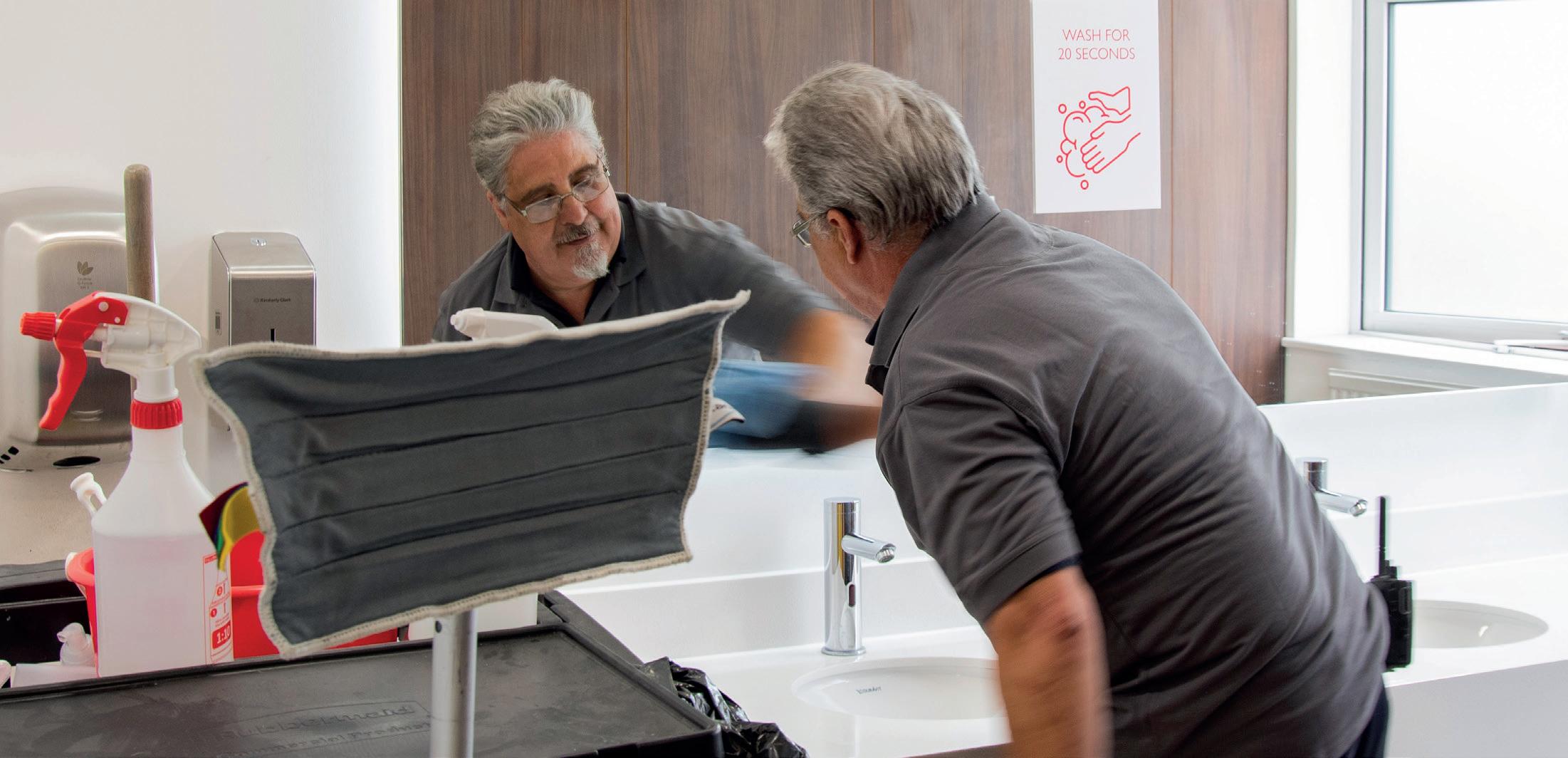
“Last week, we had someone do a great job at a shopping centre. I was able to send them £25 and a message of thanks. Everybody within Q3 can read it and respond with ‘Well done!’ That means so much to individuals at that level.”
Investment in development
Q3’s commitment to internal promotion and development is exemplified by several success stories. Leanne, formerly Martyn’s PA at Mitie, is now Finance Director after completing her qualifications. Lucy, a former bid manager, became Head of HR after earning a Master’s in HR.
“Those are two phenomenal success stories of people who have absolutely taken the bull by the horns,” Stuart said proudly.
The company currently supports 14 apprenticeships across sales, cleaning, and engineering. Notable individual achievements include Fabio, who progressed from a part-time help desk operative at Ascot Racecourse 10 years ago to contract manager at Salesforce, becoming runner-up for the Young Leader Award at the IWFM.
Innovation and technology
Q3 has embraced technology through partnerships that enhance service delivery. The company uses Q3 Check, a bespoke cleaning audit system that provides clients with real-time dashboards, trends, and photo evidence.
Own everything you’ve got, be good to people, bring the best out of people and they’ll look after you
More significantly, Q3 partnered with Facilio, becoming the first UK company to implement this comprehensive facilities management system originally developed for the Middle East market.
“What I love about Facilio is it does exactly what it says on the tin and more,” Stuart explained. “We can integrate soft services – cleaning audits, reactives, planned preventive maintenance, realtime data compliance. We’ve also linked it with SFG20 so when schedules change, it automatically updates, which means we’re always compliant.”
Environmental responsibility
Environmental considerations are integral to Q3’s operations. The company has achieved Planet Mark accreditation for ESG, accomplishing a 77% reduction in emissions across phases one and two, with a target of net zero by 2035.
Q3 has implemented chemical-free cleaning systems across 90% of its contracts using Toucan technology, which creates cleaning products from water and salt. “Our staff love it, clients love it, cost is minimal, and it’s environmentally friendly,” Stuart said.
Looking ahead
Now managing prestigious contracts including a leading social media company’s new London headquarters, Q3 continues to grow selectively, focusing on clients who appreciate their values-driven approach.
“We only want to work with people that want to work with us,” Stuart emphasised. “We would be reluctant to move down the retail route where you’re just chasing margins. It’s very difficult to make money and it drains all your management time.”
Reflecting on his journey from a young man with ladders on his van roof to managing multimillion-pound contracts, Stuart remains humble about his achievements.
“I think the skill set is just accountability: own everything you’ve got, be good to people, bring the best out of people and they’ll look after you,” he concluded. “Recruit the right team, let them get on with it.”
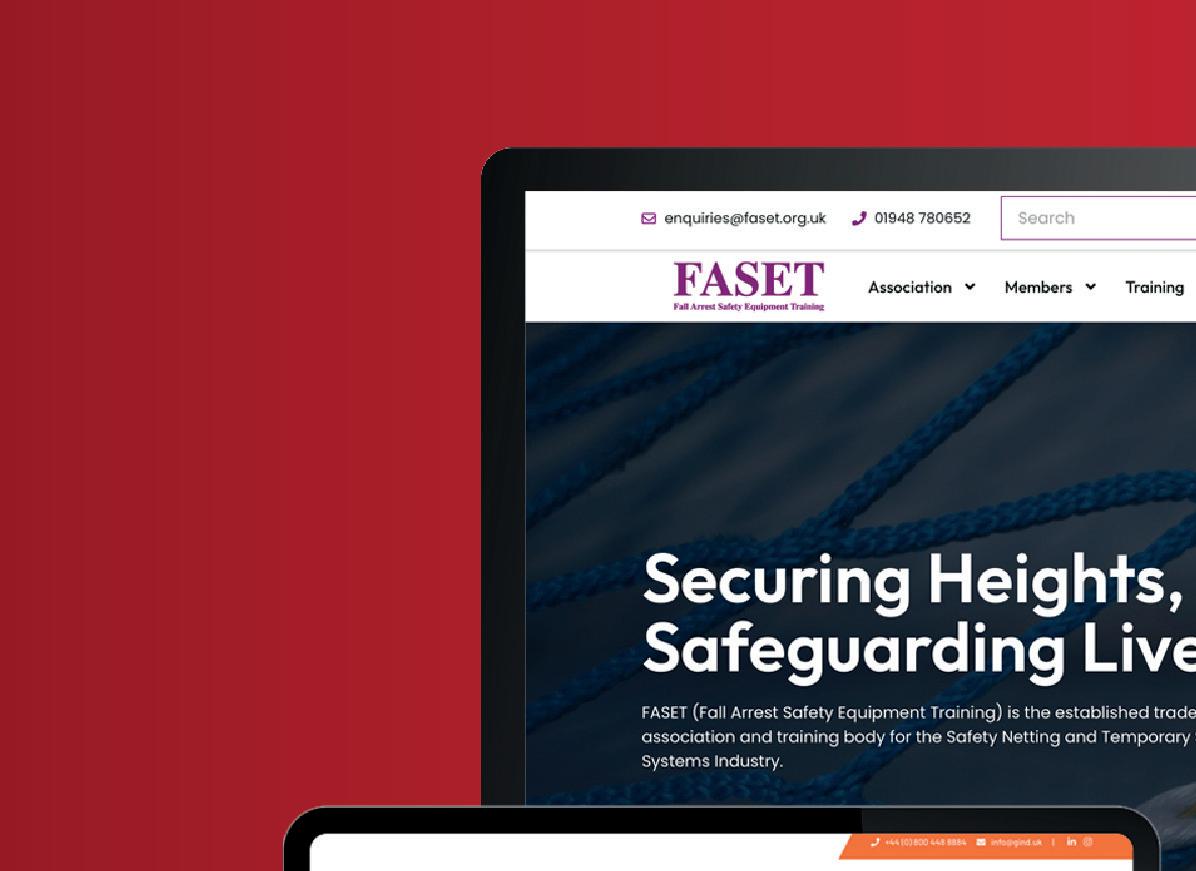
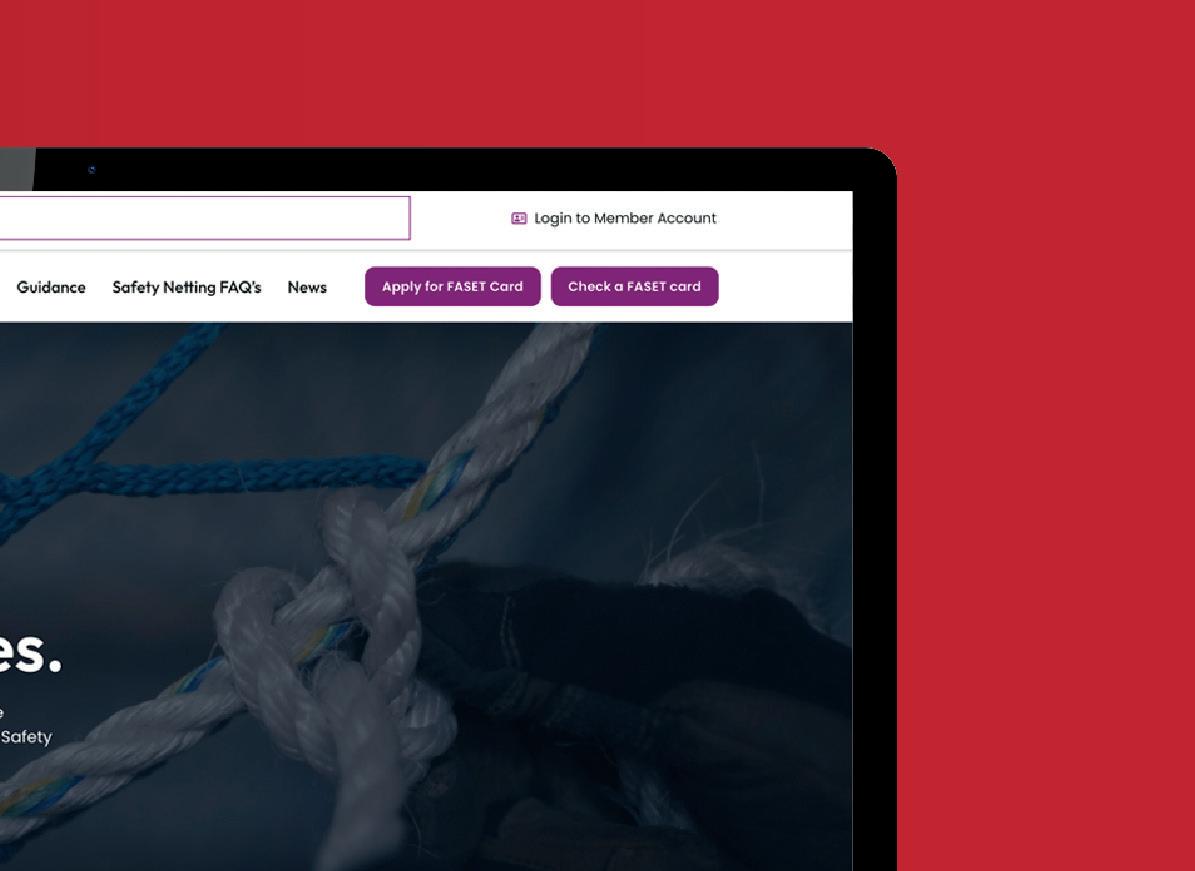
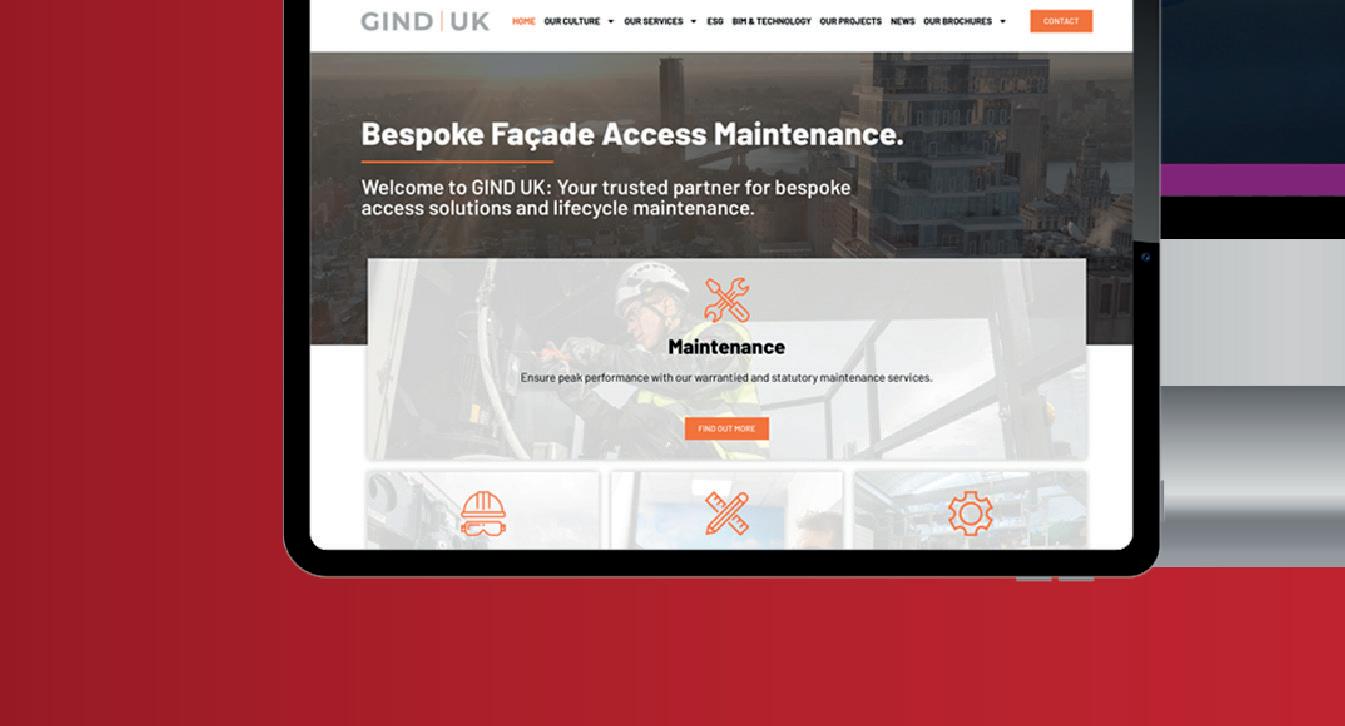
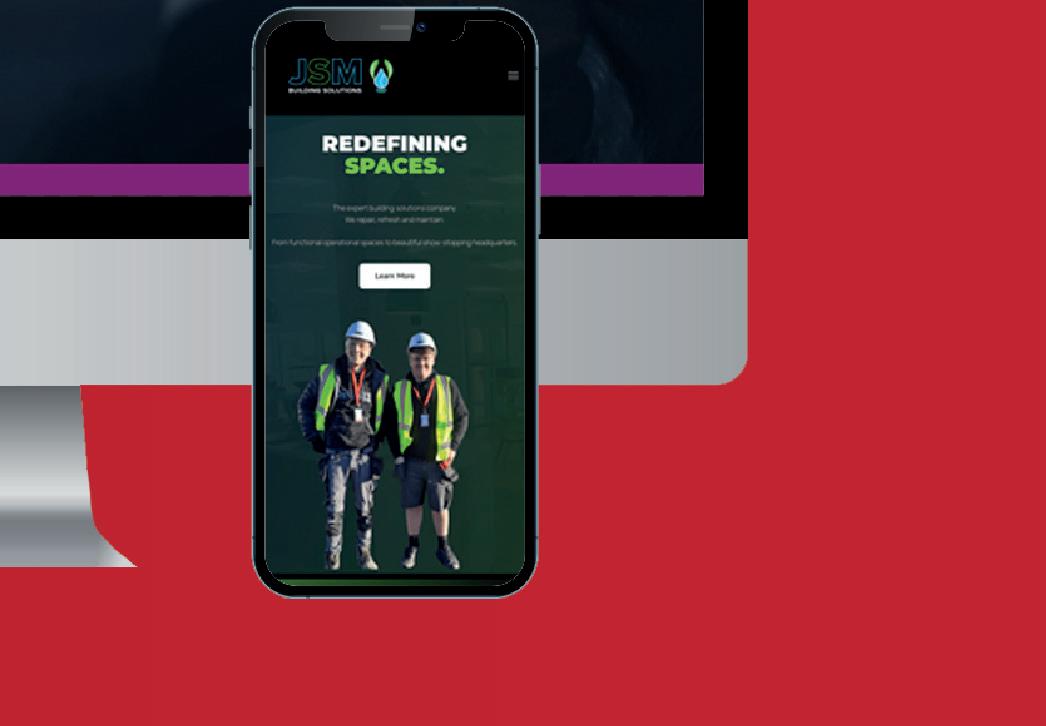

Latest appointments of senior FM professionals
FM Director will publish an overview of the industry’s latest senior new starters and details of their roles in each of its monthly publications
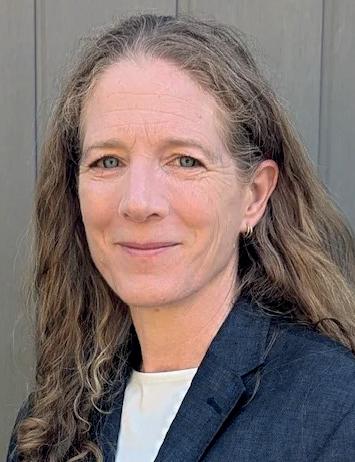
Sarah Atkinson has joined heat pump manufacturer Qvantum Energy Technology as Marketing Director.
With over 20 years of experience of B2B and B2C marketing across a wide range of sectors, Atkinson previously spent six years at Mitsubishi Electric Living Environmental Systems, where she was Head of Marketing and Product Development for the Commercial Products Group.
She said: “ I am delighted to be joining Qvantum at this exciting stage in its growth. Qvantum’s innovative design ethos puts the customer’s needs at the heart of the design process and this philosophy makes it a fantastic brand for any marketer to work on. By building products with the end customer in mind, Qvantum has developed the perfect range for the challenges of the multi-dwelling sector. I am really looking forward to being part of this organisation, where sustainability is at its core.”

The Chartered Institute of Building (CIOB) has announced the appointment of Ola Obadara FCIOB as Vice President for the 2025/26 term.
Ola, a CIOB Client Champion, has been a committed member of the CIOB since 2003 and was awarded Fellowship status in 2021. She brings a wealth of experience from both the public and private sectors, and currently serves as Group Director for Property Projects at the City of London Corporation.
A strong advocate for inclusive and forward-thinking construction practices, Ola also serves as a committee member at the British Standards Institution and is currently contributing to the development of inclusive PPE.
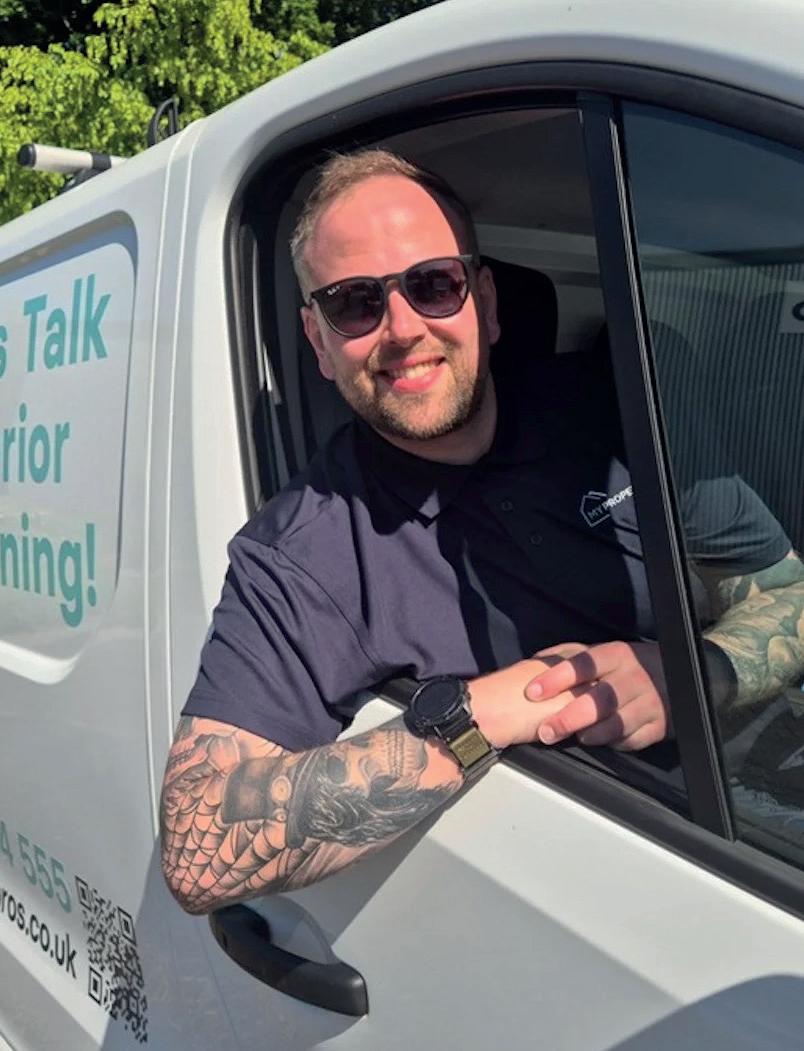
The UK’s fastest-growing exterior cleaning franchise, My Property Pros (MPP), has welcomed two brand-new recruits. With franchisees landing in Bournemouth and East & Midlothian, MPP is expanding its reach from the sunny South Coast all the way up to Scotland – and for the latter, for the very first time.
This milestone marks a major moment for the brand, with East & Midlothian now home to MPP’s first-ever Scottish franchisee, Paul Melrose. It’s a move that proves the MPP model works just as well north of the border – where the only thing more satisfying than a moss and debris-free roof is the freedom of being your own boss.
After eight years working in finance – and a stint in retail management before that – Paul Melrose realised it was time for a change. He wasn’t just after stability; he wanted a better work-life balance and a career that actually felt rewarding. After exploring countless franchise opportunities, he finally discovered My Property Pros.














The definit ive FM industry newsletter
Monday
Hard services and construction focus


Wednesday
Soft services focus



Friday
A combo of the week’s biggest stories, video interviews and exclusive features from across the FM industry


Churchill has appointed Ausra Baltrusaityte as service delivery director, strengthening its leadership team with a proven expert in aviation and complex service environments. Baltrusaityte brings over a decade of experience managing high-performing teams, complex service delivery contracts, and multi-site operations across the UK as well as a major contract in Europe.
Baltrusaityte is responsible for leading service delivery for one of the biggest names in the rail industry under Churchill’s transport portfolio, ensuring consistent, high-quality performance and customer satisfaction.
While expanding her operational expertise in the rail sector, she continues to contribute to Churchill’s aviation growth ambitions by providing expert insight, strategic support, and hands-on leadership across new business opportunities and existing partnerships.
Throughout her career, Baltrusaityte has led and participated in large-scale aviation tenders and successful mobilisations of aviation sites.
She played a critical leadership role during the COVID-19 pandemic, navigating rapid operational changes in response to the sharp decline in passenger traffic, and later driving a smooth return to full capacity.
Premier Technical Services Group Ltd (PTSG) has announced that Matthew Gilmore, Technical Director at Guardian –part of PTSG Electrical Services Ltd – has been commended by the Leicestershire Education Business Company (LEBC) for his outstanding commitment to STEM education.

Her strategic approach, adaptability, and ability to lead through uncertainty contributed to a 100% client retention rate over the past decade – a testament to her long-standing commitment to delivering high-impact results and maintaining trusted stakeholder relationships.
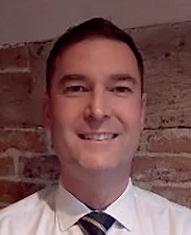
Throughout the past academic year, Gilmore has volunteered at multiple LEBC school events, sharing his expertise and enthusiasm to inspire the next generation of electricians, engineers and innovators. His involvement reflects a deep-rooted passion for education and for opening up opportunities in technical careers.
The feedback from students highlights the impact of his work, with one describing the event as “the best I’ve ever taken part in – it made my brain work, and that’s a good thing,” while others said it had given them “so many ideas” about their future and left them feeling “reassured” after their questions were answered.
Premier Technical Services Group Ltd (PTSG), the UK’s leading provider of specialist services to the construction and facilities management sectors, has appointed Mark Mitchell as Managing Director of its Electrical Services division.
Mark joins PTSG with an impressive track record spanning more than two decades in the FM and technical services sectors. Most recently, he served as Operations Director at Mitie, where he led multiple large business units. He is widely recognised for his ability to deliver cultural transformation, operational improvements and sustained revenue growth. His career achievements include doubling the turnover of Mitie Fire & Security over a three-year period, successfully merging business units post-acquisition and leading critical compliance services nationwide.
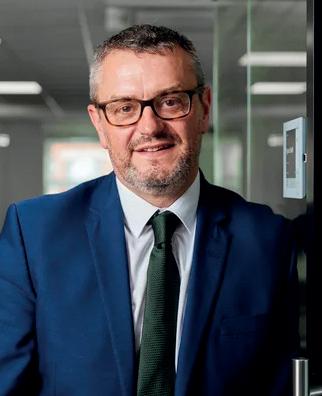
EICC Nourish, part of Levy UK + Ireland, the sports and hospitality sector of Compass Group UK and Ireland, has appointed Craig Bonner as Head of Operations at the Edinburgh International Conference Centre (EICC).
With 20 years of hospitality management experience, Craig brings specific expertise to the new role. He joins EICC Nourish from Heritage Portfolio where he has worked since 2012, most recently as Regional Operations Manager, following 11 years as General Manager of Musselburgh Racecourse.
Prior to joining Heritage Portfolio, Craig managed hotels, bars and restaurants as well as working with some of Scotland’s leading breweries. These include the Scotsman Group, Tennant’s Caledonia Brewery, Gretna Green Group and McKever Hotels.
Business Daily Group is pleased to announce the appointment of Paul Meersman as Chief Executive Officer, effective 01 August 2025.
This marks a transformational moment in the Group’s evolution – a bold step forward as the business accelerates its growth strategy, expands its service offer and strengthens its position as a leading marketing, communications and media partner across facilities management, rail, infrastructure and the wider built environment.
Paul succeeds Simon Taylor, who will continue to play a central role in the business as Executive Director, with a dedicated focus on driving the creation of new business opportunities and service lines. David McLoughlin remains Chairman of the Group, providing continuity and strategic leadership at Board level.
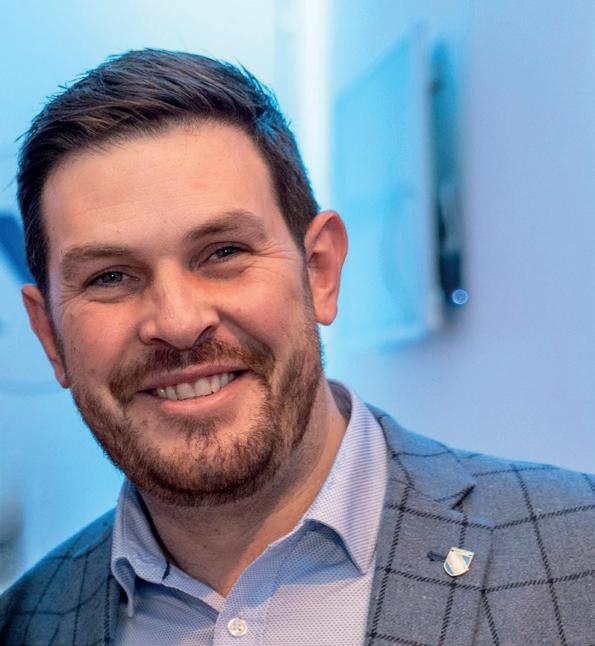
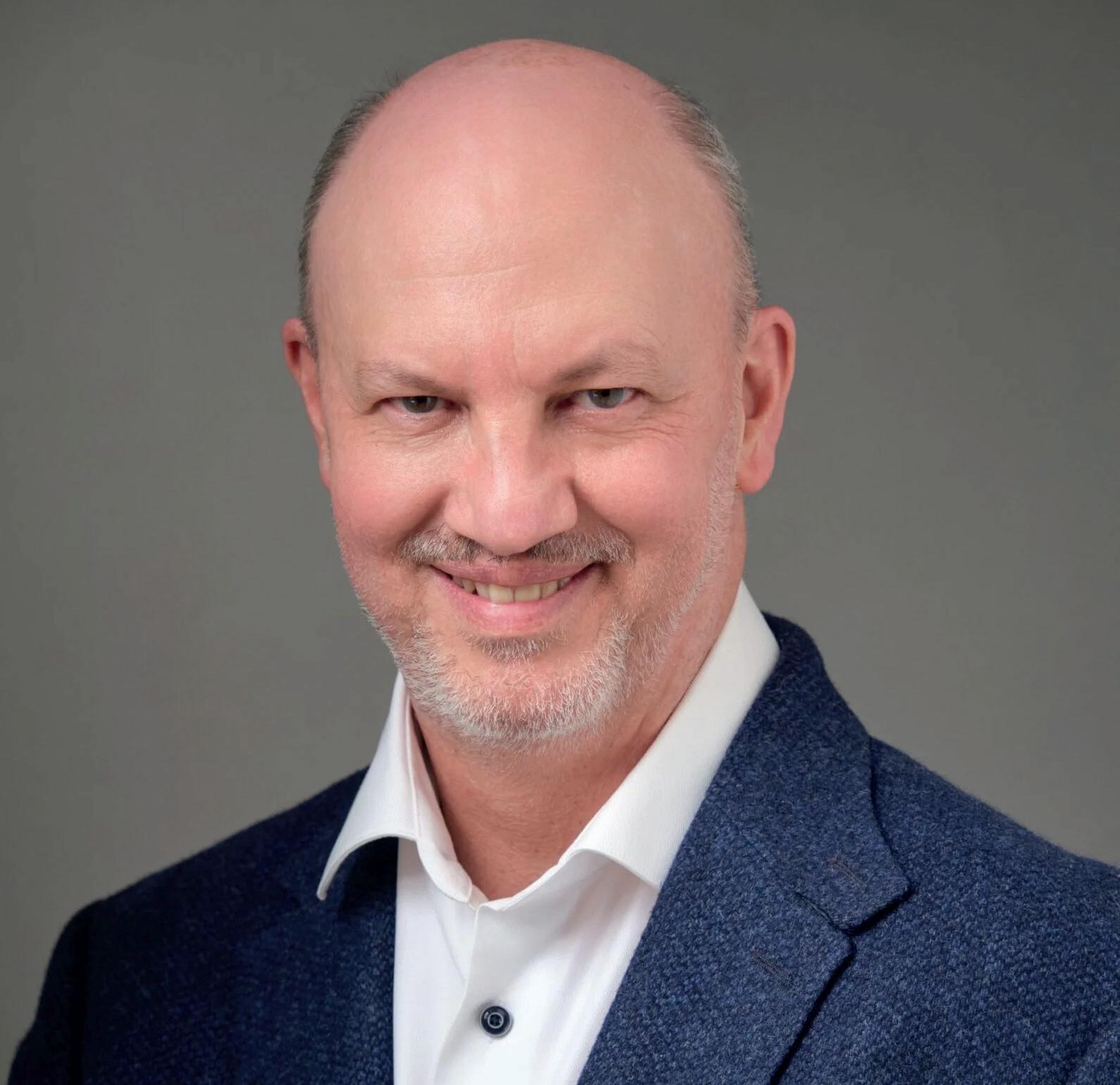
Speaking about the appointment, Simon Taylor said: “Business Daily Group has achieved outstanding things over the past few years, and we’re now ready to move at pace. With the conclusion of an exclusivity agreement on the horizon – one that had limited our external partnerships for two years – we are entering a new phase and we intend to build on our trusted brands and brilliant people to offer even more value to our customers.
Paul’s appointment signals real intent. He brings a rare mix of strategic vision, sector insight and global marketing leadership. His experience in AI, digital innovation and scalable communications will be a game-changer as we evolve our services and build the strongest possible platform for growth.”
Paul Meersman joins Business Daily Group with an exceptional track record at the highest levels of industry. His experience spans transport, infrastructure, the built environment, clean energy and water – sectors that are central to Business Daily Group’s strategy.
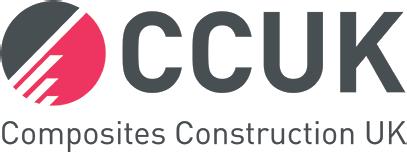
Specialist contractor Composites Construction UK operates throughout the UK and Europe. Using innovative methods, we carry out structural strengthening and repairs to concrete, timber, and masonry structures. contact@fibrwrap-ccuk.com www.fibrwrap-ccuk.com 01482 425250

Integral Cradles Ltd. delivers permanent façade access solutions across the UK, specialising in high buildings with unique specifications and demands. A whole life-cycle solution. kevin@i-cradles.com www.i-cradles.com 0845 074 2758
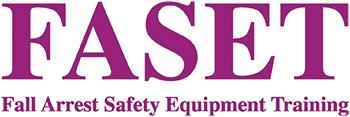
FASET is the established trade association and training body for the safety netting and temporary safety systems industry. We support members with guidance, training, and exclusive benefit schemes. enquiries@faset.org.uk www.faset.org.uk 01948 780652

For almost 30 years Julius Rutherfoord has been passionate about providing professional cleaning services to some of the most prestigious organisations in the London area. info@juliusrutherfoord.co.uk
https://www.juliusrutherfoord.co.uk/ 020 7819 6700

GIND UK delivers ambitious projects in challenging environments. Our London-based engineering and design team specialises in bespoke access system maintenance for the world’s most iconic buildings. info@gind.uk www.gind.uk 0800 448 8884

Lemon Contact Centre is a leading contact centre for the FM industry. Leveraging 20 years’ of expertise, our 24/7 contact centre services provide unparalleled flexibility, scalability and resilience for your business.
Lemoncontactcentre.co.uk 0800 612 7595

neutral carbon zone (NCZ) is a full-service platform that gives you the tools your company needs to make the transition to a carbon neutral business and beyond. gozero@neutralcarbonzone.com www.neutralcarbonzone.com 0845 094 5976

SAEMA has a long history in delivering the best training and guidance in the temporary and permanent suspended access industry. We are committed to advancing safety through raising the standards in best practice. info@saema.org https://www.saema.org/ 01948 838616
Project Management Global is a media platform and community for professional project managers. Providing informative news, industry insights, career support, resources and jobs for project managers across the globe. news.pm-global.co.uk

Seddon Management Services strives to offer the best solutions for trade associations to keep their members safe and compliant. becky@managementandauditing.co.uk www.seddonmanagementservices.co.uk 07854 226251
Premier Technical Services Group Ltd (PTSG) is the UK’s leading provider of specialist services to the construction and facilities management sectors. info@ptsg.co.uk https://www.ptsg.co.uk/ +44 (0) 1977 668 771




YorPower is one of the industry’s most trusted providers of back-up power solutions (generators and UPS) for customers in a wide variety of sectors, both in the UK and around the world. sales@yorpower.com www.yorpower.com 01977 688155
Fire dampers are you legally compliant?

Did you know that 70% of buildings surveyed fail their initial fire damper inspections? This concerning statistic highlights a significant risk to building safety and legal compliance.
Under BS9999, fire damper testing is a mandatory annual requirement. Non-compliance can result in:
• Void insurance coverage
• Substantial fines
• Potential imprisonment
• Compromised building fire strategy
• Risk to occupant safety
Your fire strategy is only as strong as your weakest fire damper. Just one failed damper can compromise your entire building’s compartmentation system.
At Indepth Services, we’ve been protecting properties and lives for over 40 years. Book your free site survey today. Call us on 020 8661 7888 Visit our website to download our free Fire Damper Compliance Guide to understand your full legal obligations www.indepthservices.co.uk
As part of PTSG, we provide:
• Testing compliant with BS9999, Fire Safety Order 2005, Fire Safety Act, SFG20, HTM02 & HTM05
• Comprehensive documentation for insurance compliance
• Expert remedial works when needed
• Clear, detailed reports
• Minimal disruption to your operations
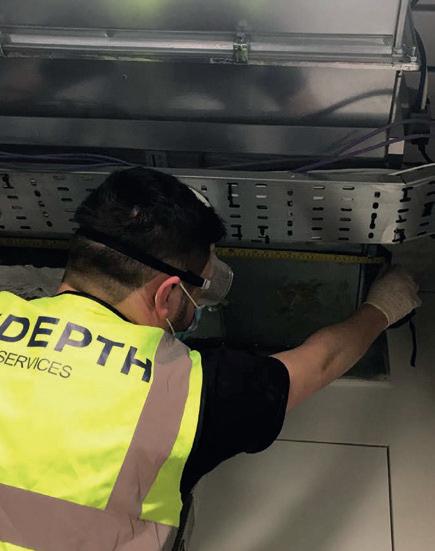


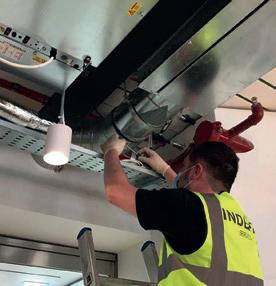





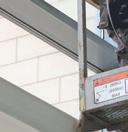



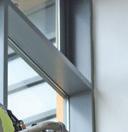

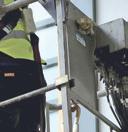

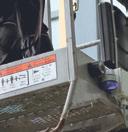



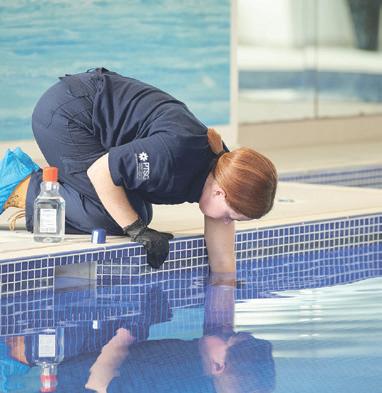























































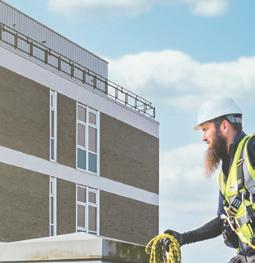































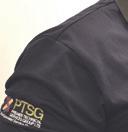

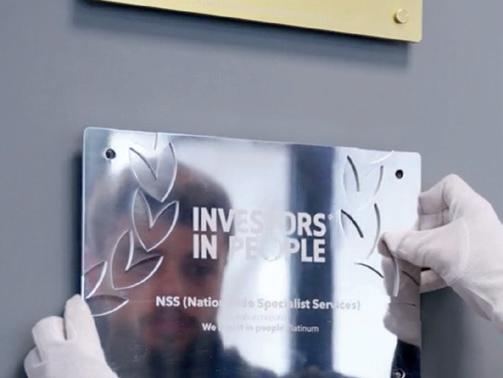



At the heart of our success is a highly trained, accredited workforce and a customer-first mindset that runs throughout our culture.
This approach has helped us build enduring relationships with FM and construction leaders who know they can depend on us to deliver safely, reliably and professionally.
If you need to talk to a specialist who listens to your unique requirements, talk to PTSG.
Contact us today for a free, no obligation chat about how we can help you to keep your buildings safe and compliant.
